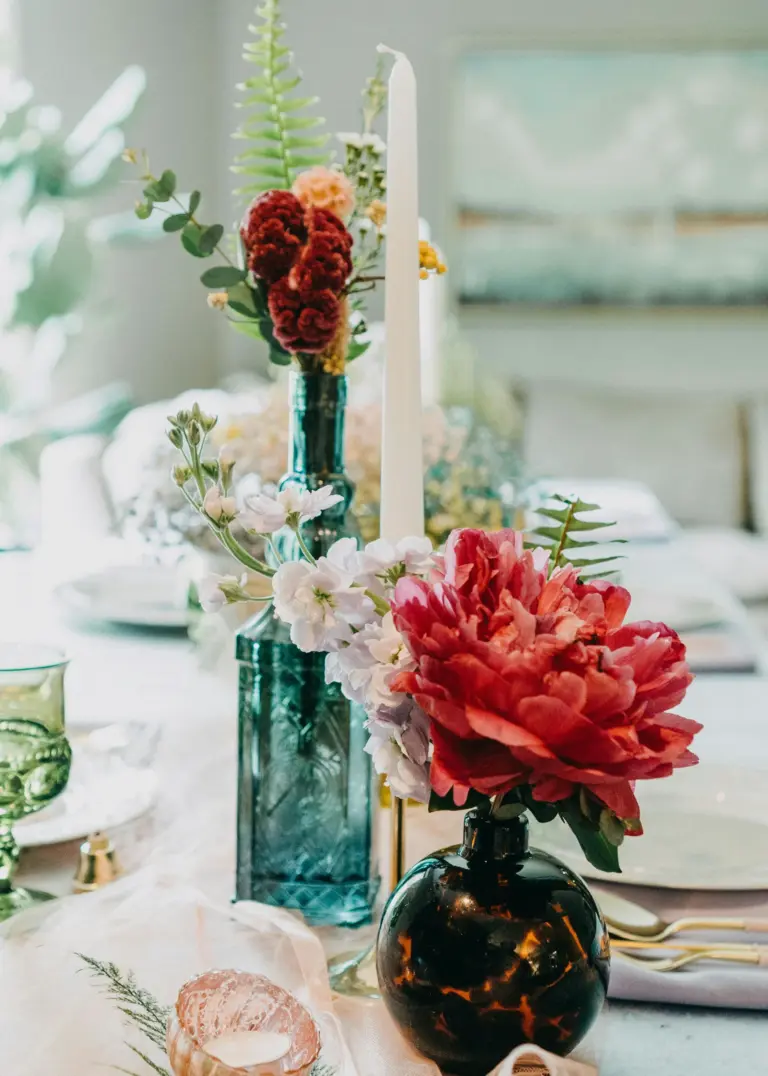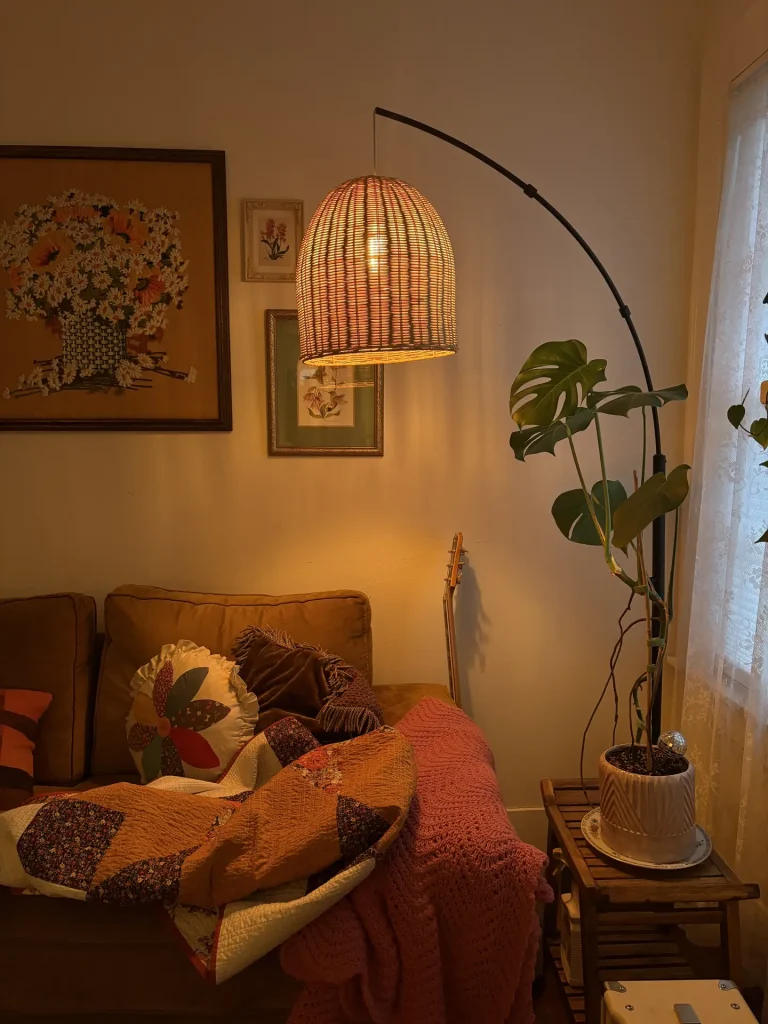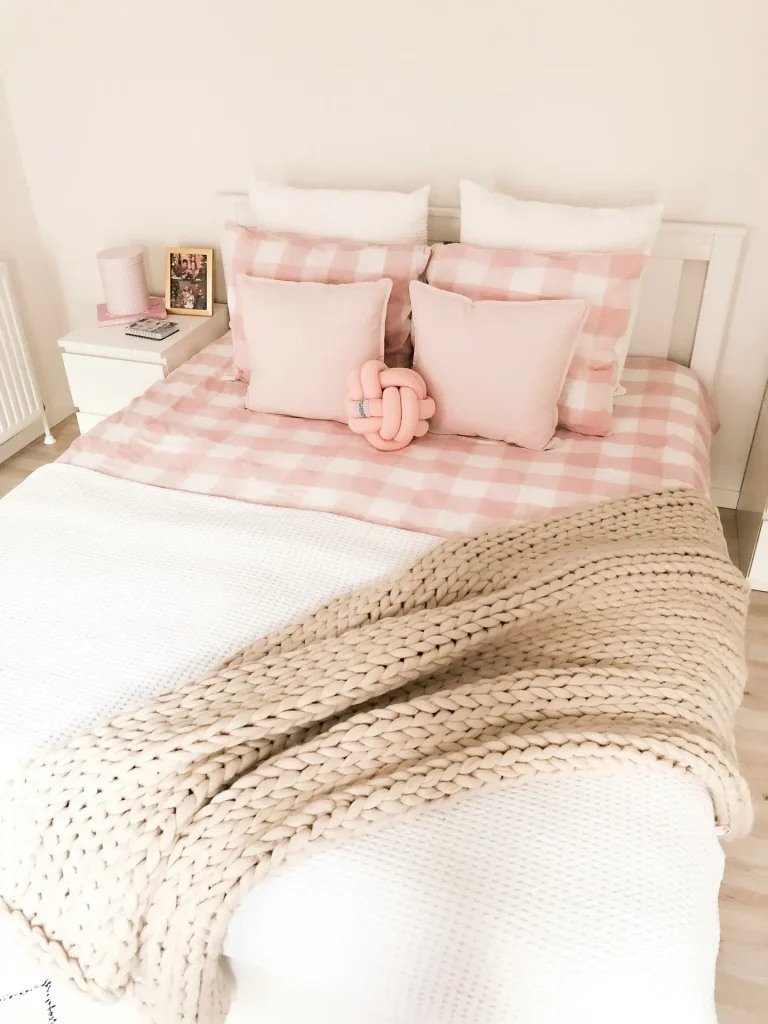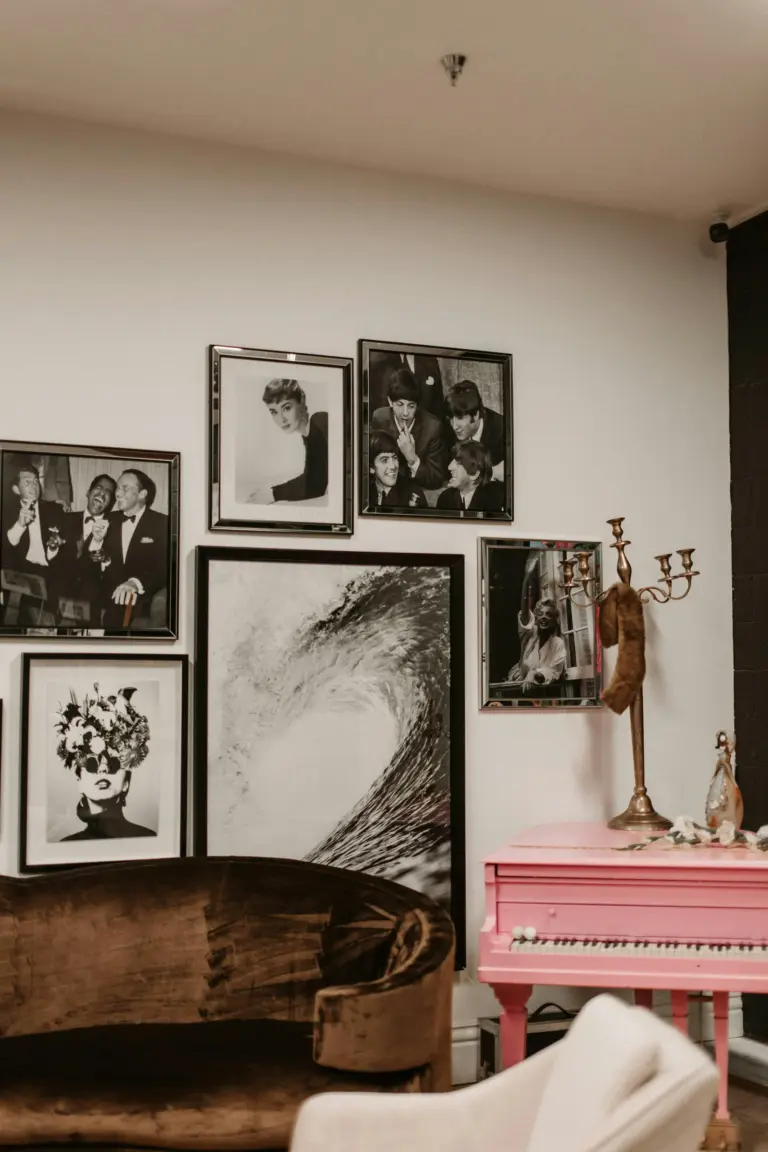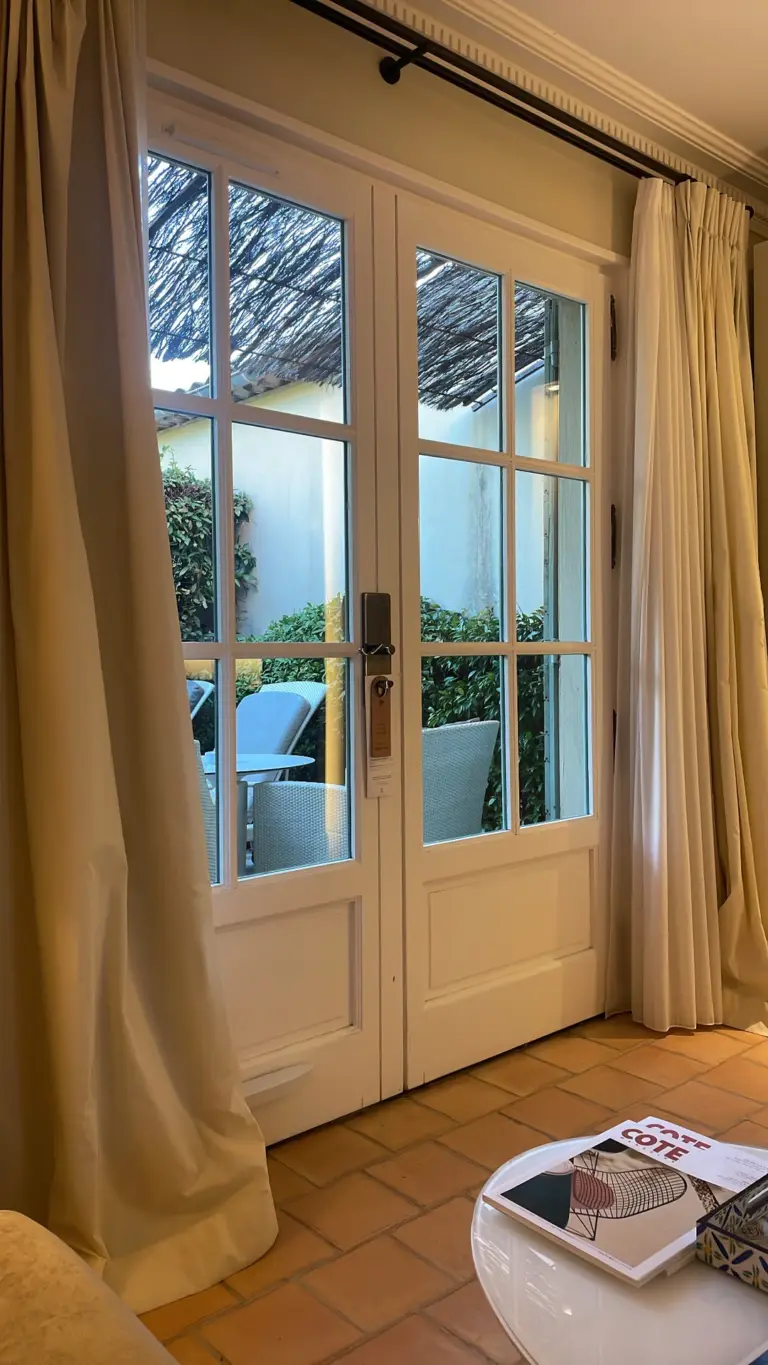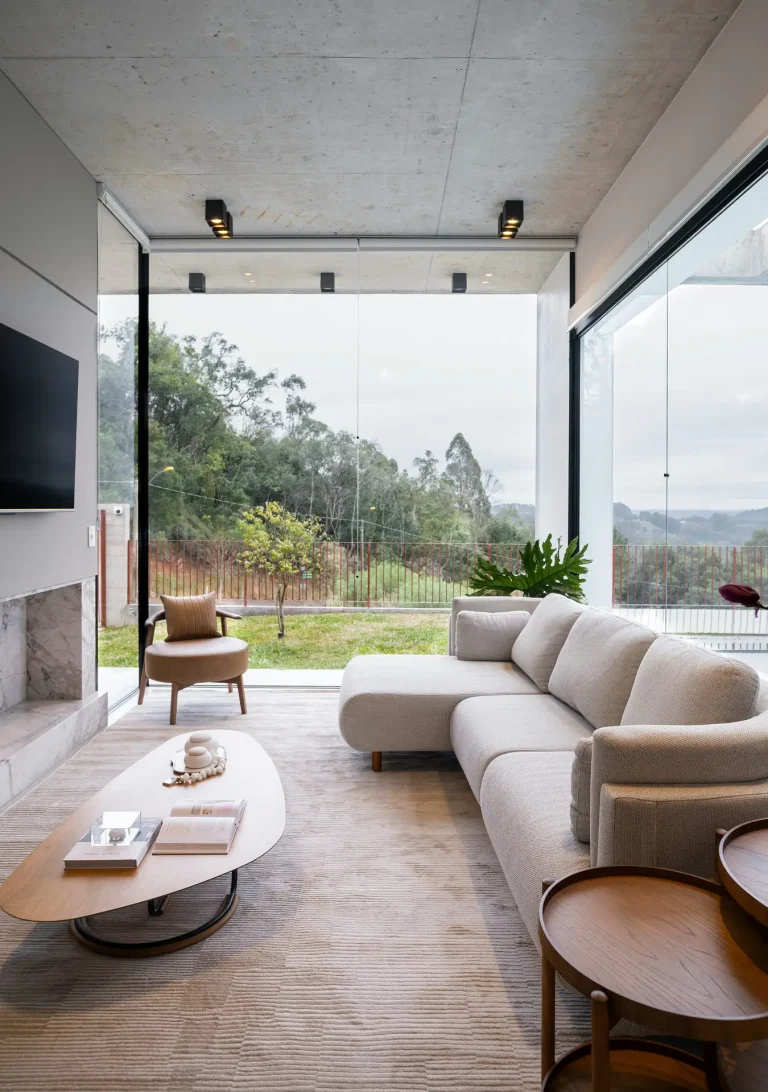The 21 Best Living Room Ideas: The Ultimate Guide To Creating Your Dream Space
This blog post will tell you everything you need to know about living room ideas.
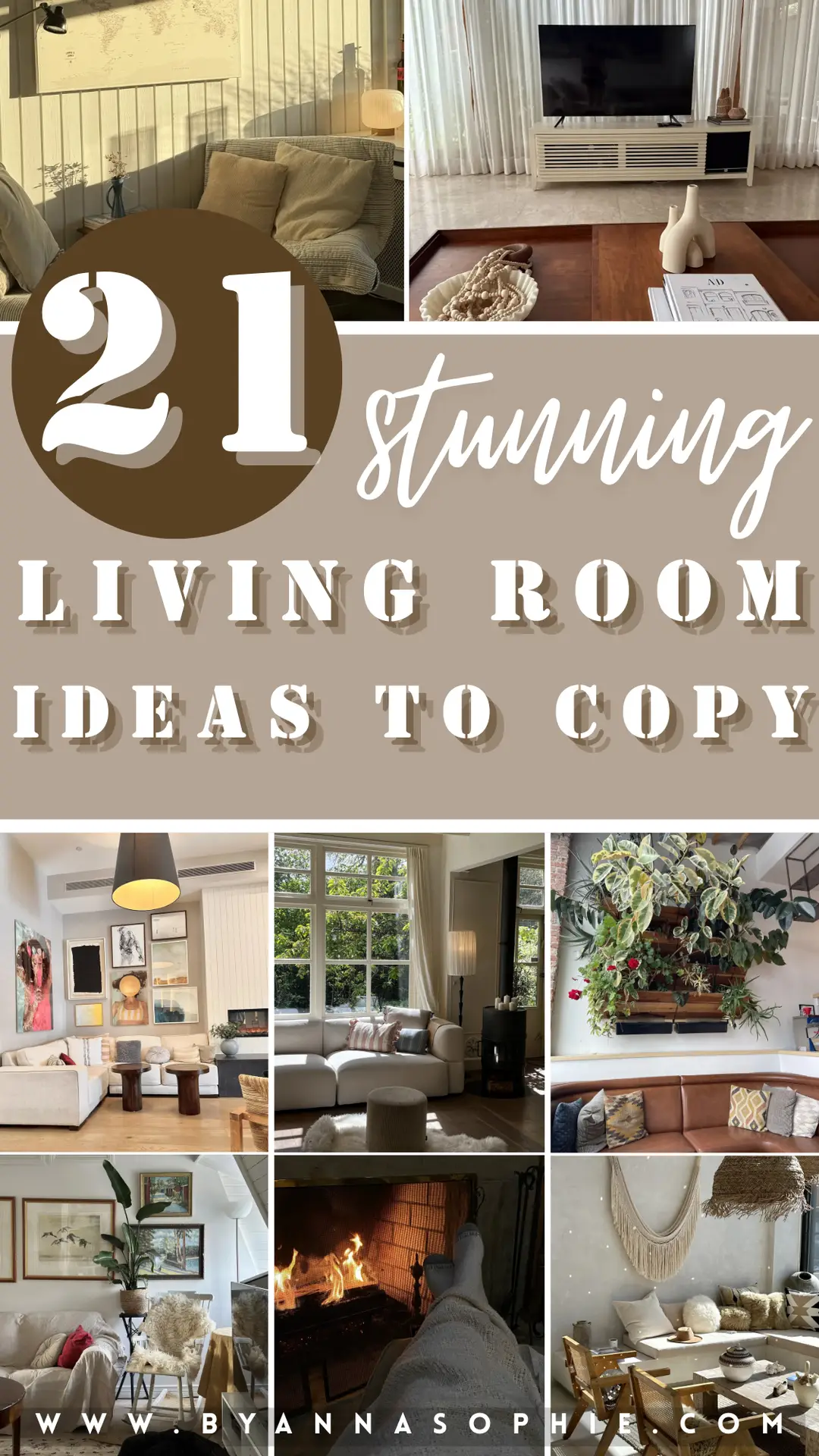 Save
Save Putting together a living room that actually works can feel overwhelming.
There’s a lot to think about: Where the couch goes, what colors to use, which rug won’t show every crumb. And it matters because this is where you’re going to be spending most of your time at home.
In this blog post, I wanted to put together something that covers all of it. What to consider when it comes to the layout of your living room, how to divide up the space if it’s big or awkward, different style directions you could go, colors and materials that actually work together and all those smaller decisions that end up mattering more than you’d think.
You’ll find 21 living room ideas in here, plus practical information like working with the budget you’ve got, fixing the things that aren’t working right now and figuring out where to even start.
The goal is just helping you end up with a room that feels like it’s actually yours and not something you copied from a catalog.
This site includes affiliate links, meaning I may receive a small commission, at no additional cost to you.
The Foundation
Okay, the first step is figuring out the basics of your living room.
I recommend to take measurements, look at the floor plan, notice when daylight comes in and how it shifts throughout the day.
Then think about how you actually use the space. Is it mostly for having friends over and parties? Or for cozy family time? Or does it need to do multiple things?
The budget matters too. I advise to set a realistic number if you’re planning to buy furniture, paint, decor, curtains etc.
And know your style. This makes everything look more cohesive instead of random. If you’re not sure what your style is, take some quizzes or questionnaires online. They help narrow it down.
Layout & Space Planning
Let me walk you through the basic principles of furniture arrangement so you can use this when designing your living room.
When arranging furniture, think about conversation areas and traffic flow. I recommend to create spots that encourage people to sit and talk, but make sure there’s still room to walk through without bumping into everything.
Your strategy depends on whether your living room is small or large.
Small living room:
- Use multifunctional furniture, like sofa beds, coffee tables with storage and folding furniture. This saves space and gives you options
- Stick with light, neutral colors because they make the room feel bigger
- Wall-mounted shelves don’t eat up floor space and maximize vertical storage
- Also place mirrors strategically so they reflect light. This makes the room brighter and tricks your eye into thinking it’s bigger than it is
- Furthermore, I’d use small sectionals or loveseats instead of massive sofas
- Plus: Keep decor minimal. It’s best to choose fewer pieces, but make them count
Large living room:
- Create multiple seating areas so the space doesn’t feel empty
- I’d also use rugs to define different zones. Room dividers or large plants work as well
- Statement furniture in bigger sizes can become real focal points without getting lost
- I advise to fill vertical wall space with tall shelves and artwork so it doesn’t look bare
- You can actually use bold colors and patterns here without worrying they’ll overwhelm the space
- Different lighting levels add atmosphere and structure
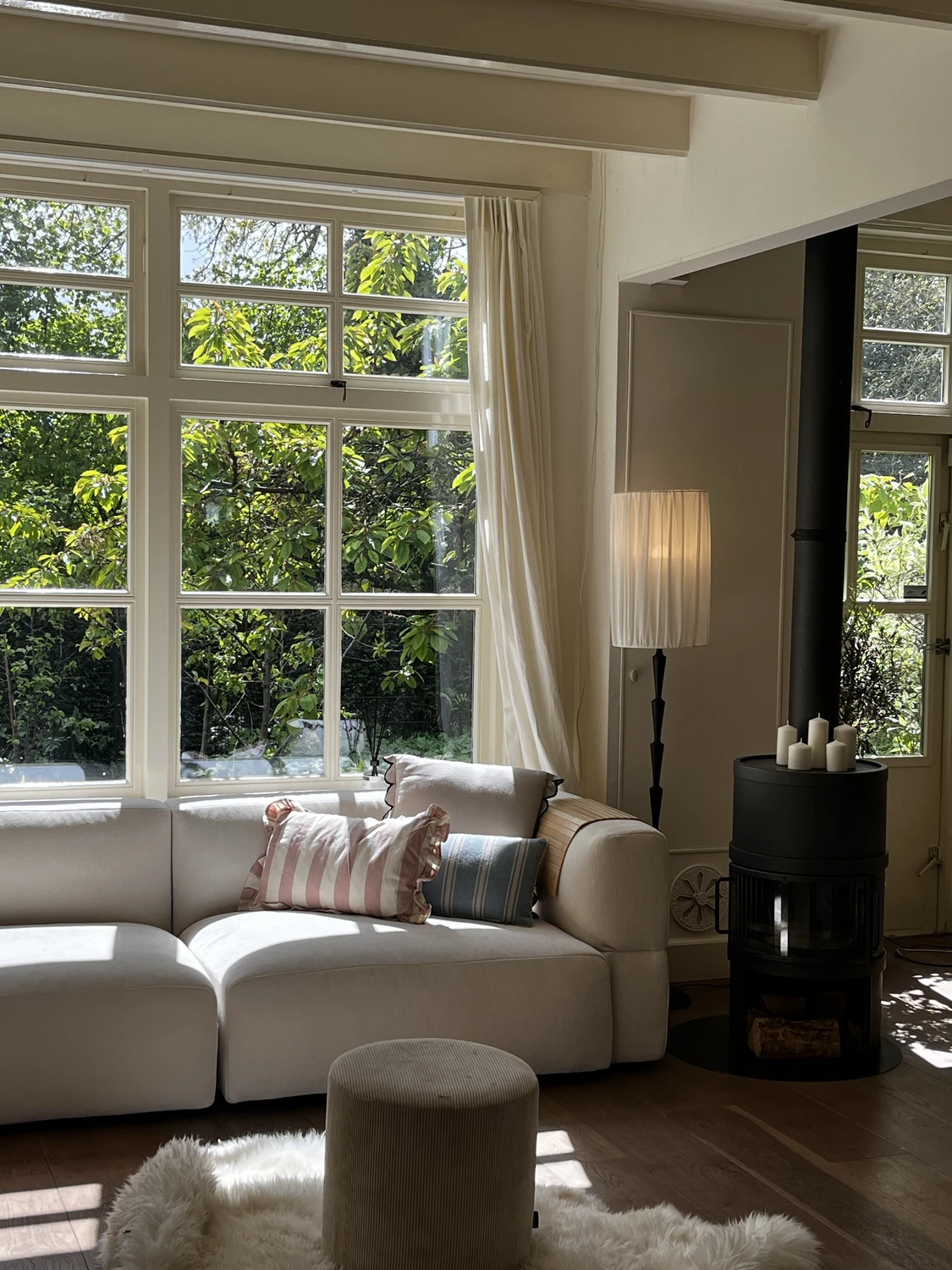 Save
Save Zoning Techniques
If you want to use your living room for multiple purposes, there are various zoning techniques for dividing the room:
- Carpets as zone markers: Different carpets for different areas (e.g., living area, work area, dining area)
- Furniture positioning: Use sofas and shelves as subtle room dividers without erecting walls
- Lighting concepts: Separate light sources for each area (floor lamp at the workplace, pendant lamp above the dining area)
- Color differentiation: Different color accents or wall colors for different zones
- Room dividers and screens: Decorative partitions, open shelving systems or curtains for flexible separation
- Height differences: Platforms or lowered areas for physical separation
- Functional furniture: Consoles or sideboards as natural boundaries between zones
- Wall design: Wallpaper, panels or artwork to visually delineate areas
- Plants as room dividers: Large plants or groups of plants for natural zoning
The Main Style Categories
There are several basic style categories to choose from. Depending on your personal taste, you may be able to classify yourself under one of them.
Modern/Contemporary
The modern or contemporary style is characterized by clean lines and minimalist furnishings. The color palette is rather neutral but with bold accents, so you can really be daring here! Furniture is typically sleek and made of glass or chrome and abstract art and sculptural lamps serve as accessories.
Traditional/Classic
If you like elegant, symmetrical and timeless designs, the traditional-classic style could be for you. It is elegant, symmetrical and simply timeless. You can choose earth tones, burgundy, navy blue and gold as colors. Chesterfield furniture, antique pieces and wooden details in particular will give your living room a traditional look. For decoration, you can use crystal, oil paintings and Persian rugs to create a classic touch.
Scandinavian/Minimalist
The Scandinavian style is known for being minimalist, functional, simple and cozy (hygge!!). Scandinavians love light colors such as white, pastel shades and light wood. Accordingly, you should choose light wood furniture if you want your living room to look Scandinavian. Accessories that are typical of Denmark/Sweden/Norway include candles, plants and ceramics.
Industrial
Do you love the urban loft look? Then pay attention! The industrial style uses dark colors. Gray, black, rust red and metallic tones give your living room an industrial feel. Furniture should be a mix of metal and wood to reflect the factory style. Does your home have exposed pipes “by nature”? Perfect! It couldn’t be better. Otherwise, Edison lamps also look good in an industrial living room.
Boho
If you love creativity, individuality and multiculturalism, then the boho style is probably just right for you. This is a mix of styles, including vintage pieces and rattan furniture. Color accents are bold in warm colors and jewel tones. A typical boho living room is also characterized by lots of plants, macramé and colorful cushions.
Coastal/Hamptons
Sun, beach, summer, sea… Who wouldn’t want this vibe in their home? Coastal living rooms are usually airy, bright and ideally close to the beach (in terms of decor, that is. Unless your house is actually on the beach? Then that counts too, of course! :D). When choosing colors, go for white, sand tones and blue. I also recommend white wooden furniture, rattan furniture and linen fabric covers. For the typical beach look, you can decorate with shells, anything with stripes and maritime decorations.
Farmhouse/Rustic
The typical farmhouse style exudes a cozy, rural ambience and has a rustic yet charming feel. Here, too, vintage furniture and objects are used to bring back the charm of bygone times. Anything white, beige or made of natural wood fits perfectly into your farmhouse-style living room. Solid wood furniture and furniture with a distressed look are ideal for bringing that country house feeling into your home. Baskets, vintage signs and fresh flowers complete the look.
Want more inspiration for your farmhouse-style living room? In this blog post, I’ll show you 15 farmhouse living room ideas that go into more detail.
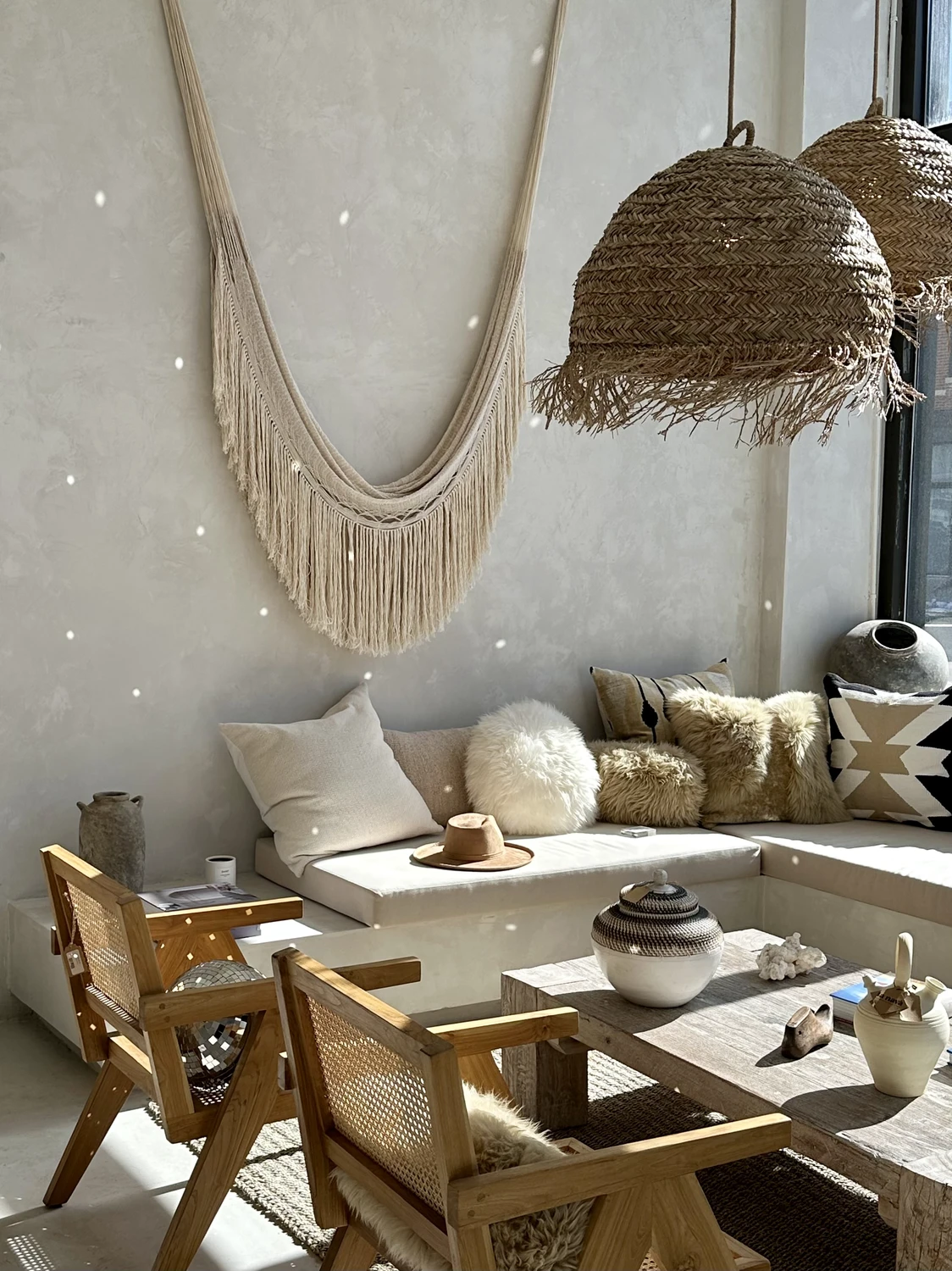 Save
Save A Deep Dive Into Essential Elements
Next, we’ll take a look at the essential elements for your living room that you need to create a real feel-good space.
When it comes to seating, you have a choice of different options: Sofas, sectionals, chairs and ottomans are just a few that I’ll mention here. It all depends on how big your living room is, what you want to use it for in the first place and what your personal preferences are.
Of course, you also want to store things. You can use built-ins, cabinets or get creative. Psst, maybe your living room even has hidden storage solutions? If so, make sure to use them!
When it comes to lighting, I would always make sure to integrate layered lighting. Install ambient, task and accent lights to create a cozy atmosphere and be able to practically use different light sources depending on the situation.
What you shouldn’t neglect are the windows. Curtains, blinds or shutters can make a significant difference in the overall appearance. Additionally, they provide privacy, a cozy factor and protection against fading all in one.
Psst, you want to learn more about curtains? My blog post shows you 13 curtain ideas for the living room you definitely don’t want to miss!
You also have several design options for the floor. Either you let the hardwood show or you choose rugs. Again, it depends on the size and the zones of your living room.
Equally important: The walls of your living room. Here you can really be creative and choose between wall paint, wallpaper, paneling and gallery walls. Your creativity knows no bounds!
Which Colors To Choose?
Colors and materials play a significant role in how your living room looks and feels.
Have you ever heard of color psychology? If not, that’s no problem, I’ll briefly list here how different colors affect us humans:
- Blue: Calming, relaxing, promotes tranquility and concentration
- Green: Natural, balancing, has a refreshing and harmonious effect
- Yellow: Energetic, cheerful, stimulates optimism
- Red: Stimulating, passionate, can be overwhelming (therefore, use sparingly)
- Gray: Neutral, versatile base for any style
- Warm tones (orange, terracotta): Cozy, inviting, promote sociability
- Cool tones (violet): Reserved, elegant, visually enlarge the space
I find it totally interesting how the choice of color alone has an effect on how we perceive a space.
If you don’t want to experiment (which I can understand!), I recommend sticking to popular color schemes that have already proven themselves:
- Monochromatic: Different shades of a color for a calm, harmonious atmosphere
- Complementary: Opposite colors on the color wheel (e.g., blue and orange) for dynamic contrasts
- Neutral + Accent: Beige/Gray/White as a base with a strong accent (Petrol, Mustard Yellow, Terracotta)
- Analogous scheme: Adjacent colors (e.g., blue-green-turquoise) for gentle transitions
As a general rule, you can remember the 60-30-10 rule, which states that you should keep 60% of the room in the main color, 30% is good for the secondary color and you can reserve 10% for your accent color.
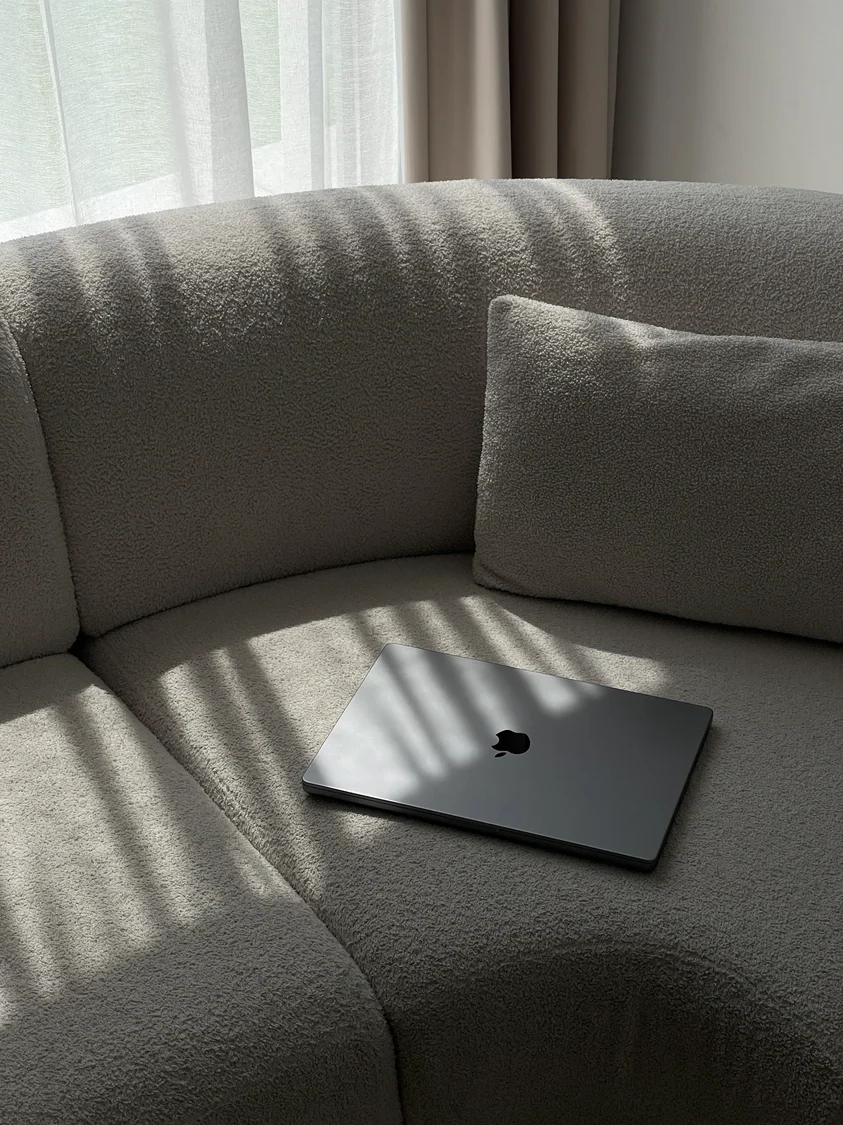 Save
Save Material Guide
I think it is advisable to create a contrast with different materials and, for example, combine smooth with rough surfaces (e.g., velvet + linen, glass + wood).
A few different types of fabric that you can use:
- Velvet,
- Linen,
- Wool,
- Cotton,
- Leather
In my opinion, it’s best to choose 3-5 textures per room and not to choose too many to avoid an overload.
Additionally, you can use natural and artificial materials together, just make sure they are balanced. Examples of this are wood + metal, stone + glass.
I also like to recommend combining high-gloss surfaces with matte textiles to create visual interest. This way, everything doesn’t appear uniform and flat.
Living Room Ideas
Your living room is where you actually live. Not the bedroom where you sleep, not the kitchen where you grab coffee, this is the room where everyone ends up during parties, where the actual day-to-day stuff happens.
So whether you’re going for that cozy vibe or you want it looking sharp and modern or honestly just whatever feels right to you, I’ve got 21 living room ideas here that hopefully might spark something.
1. Floating Furniture Arrangement
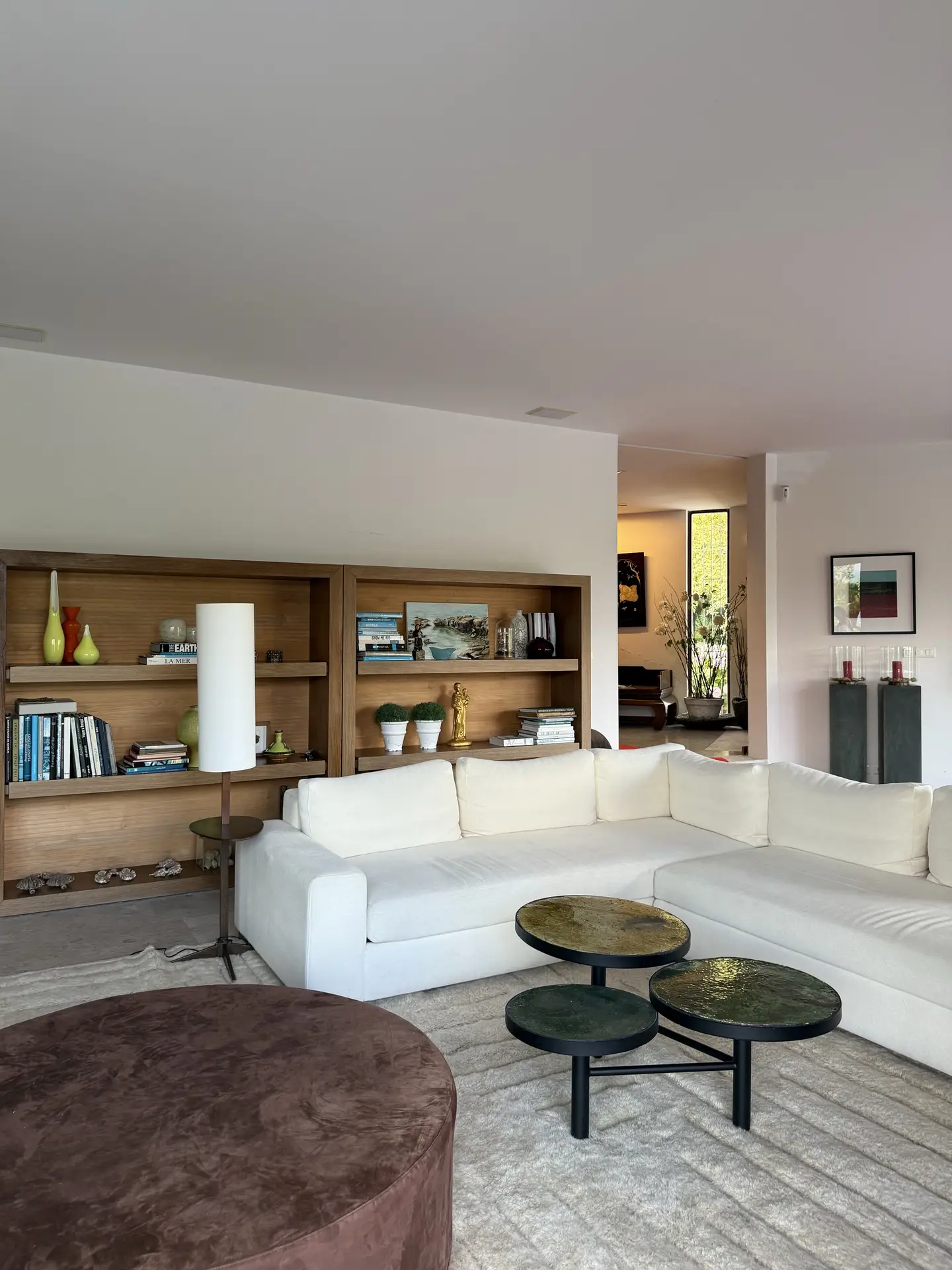 Save
Save If you want your living room to feel more open and spacious, consider arranging your seating area as a floating arrangement.
A rug placed under the furniture will visually anchor the seating area.
This immediately makes it clear: This is where the seating zone in your living room is located.
2. Multi-Functional Zones
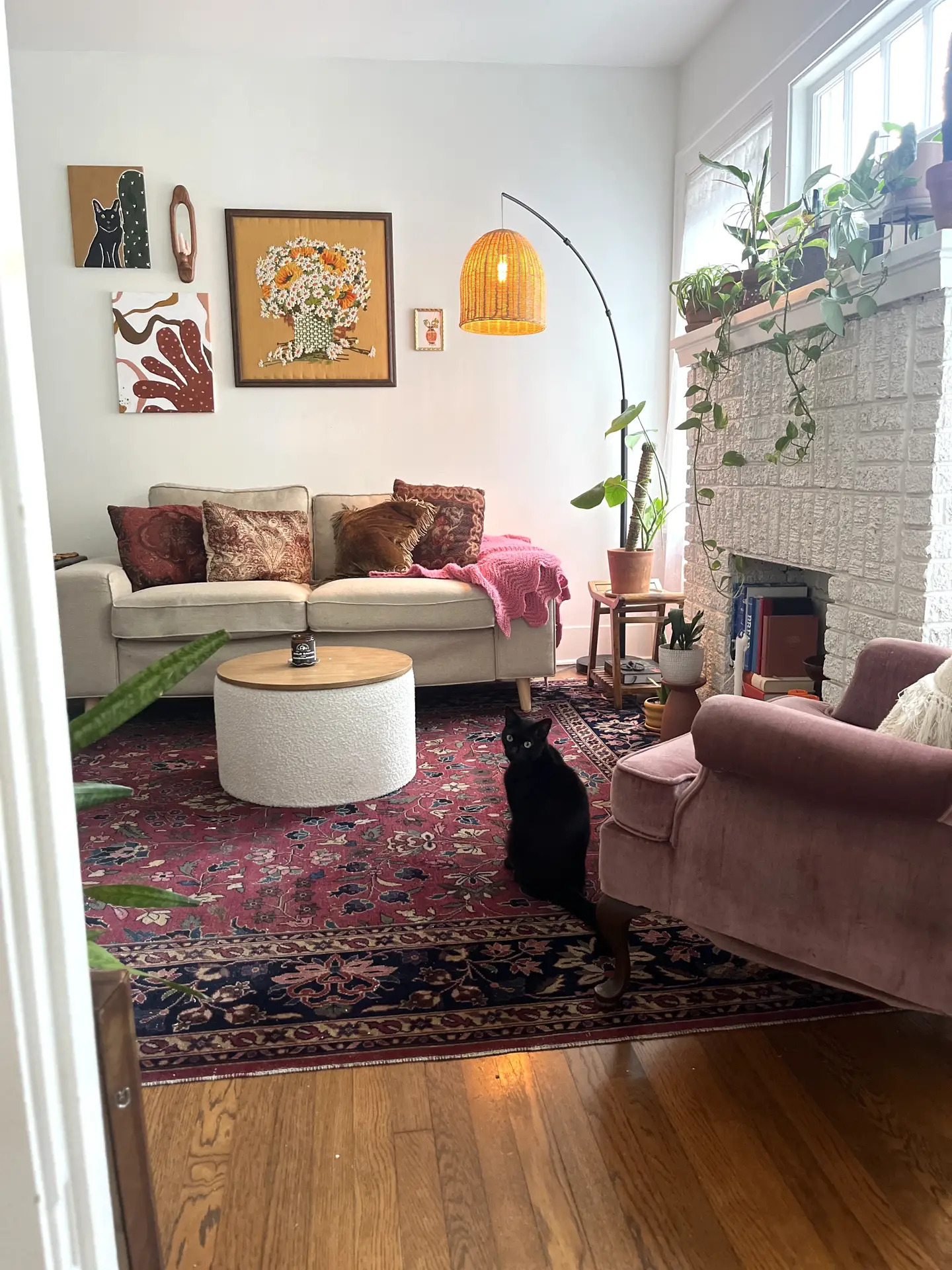 Save
Save Multi-functional zones combine several areas in your living room.
By dividing the room into zones, you can create, for example, a seating area, a reading nook, a dining area, etc.
Visually, you can achieve this with rugs, lighting or furniture.
This way, you truly get the most out of your living room.
3. Monochromatic Layering
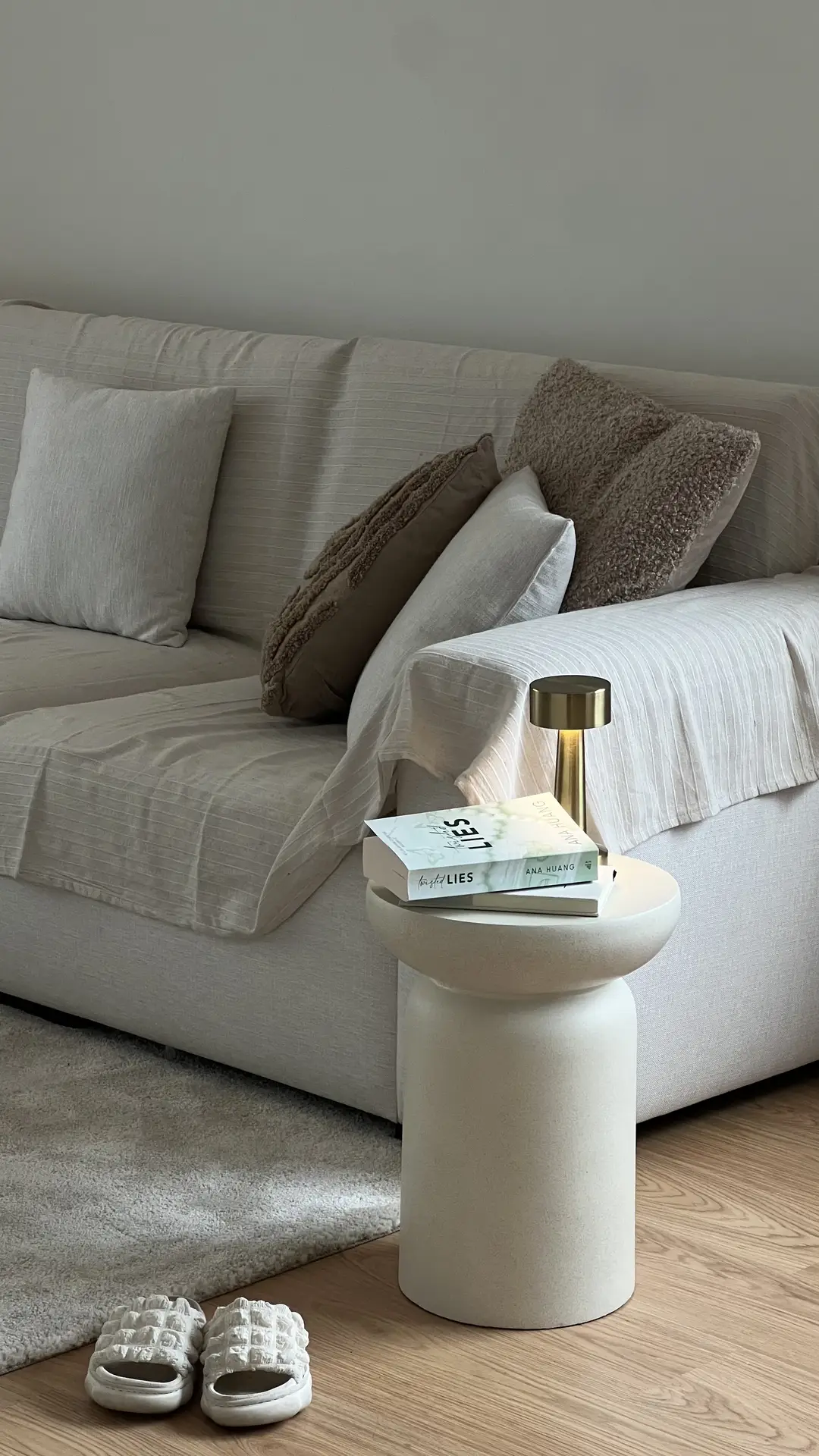 Save
Save Monochromatic layering creates a harmonious overall look and makes your living room feel calm and serene.
To achieve this look, combine neutral colors from the same color palette.
You can still use different materials, the important thing is that they come from the same color family.
4. Statement Lighting As Art
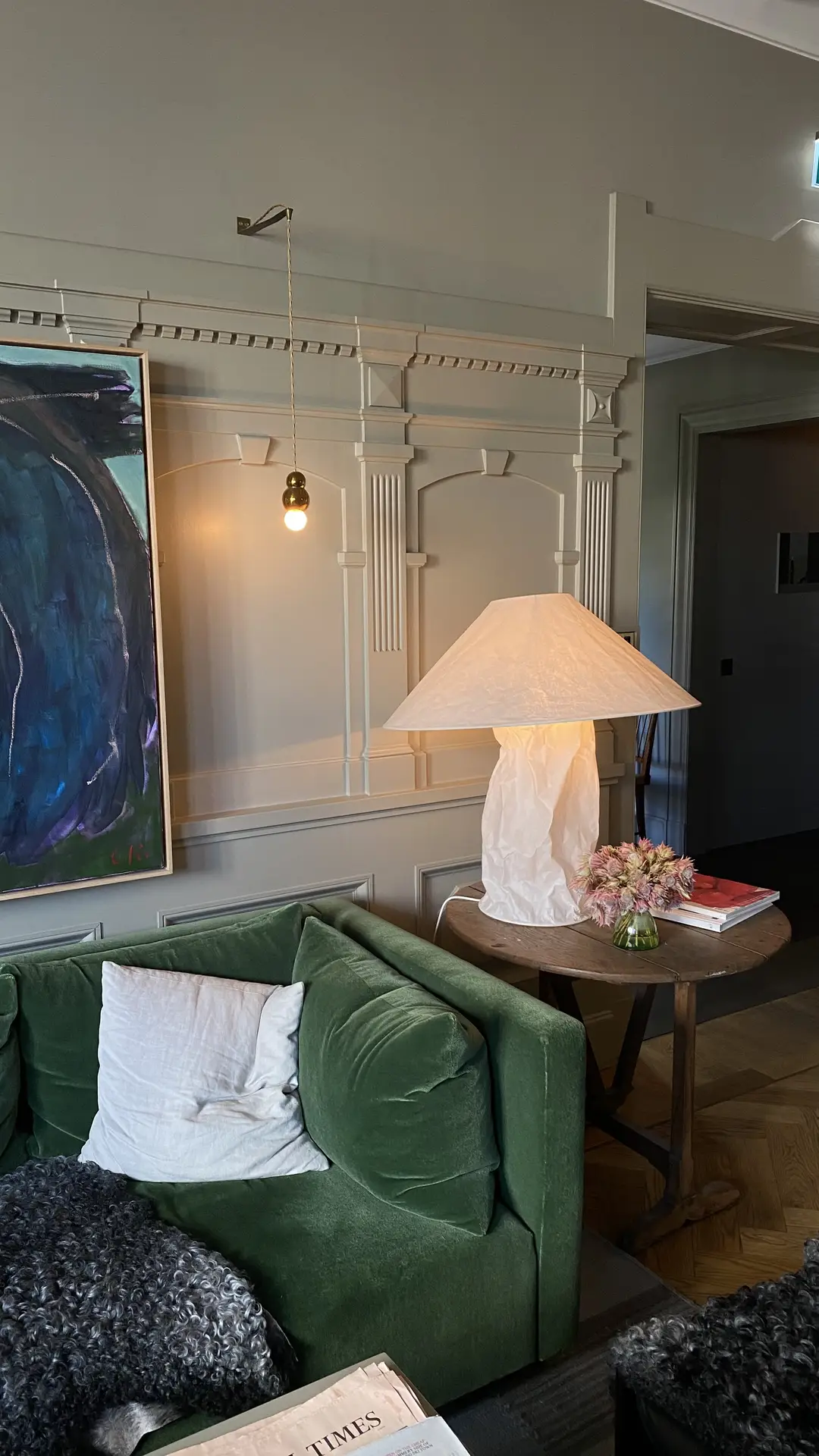 Save
Save This decorating idea is perfect for fans of extravagant looks.
With a statement lamp, you bring a unique work of art into your home that not only provides light but is also a real eye-catcher.
In my opinion, a statement lamp like this looks great on coffee tables, dining tables or in a reading nook, for example.
5. Built-In Storage – Living Room Ideas
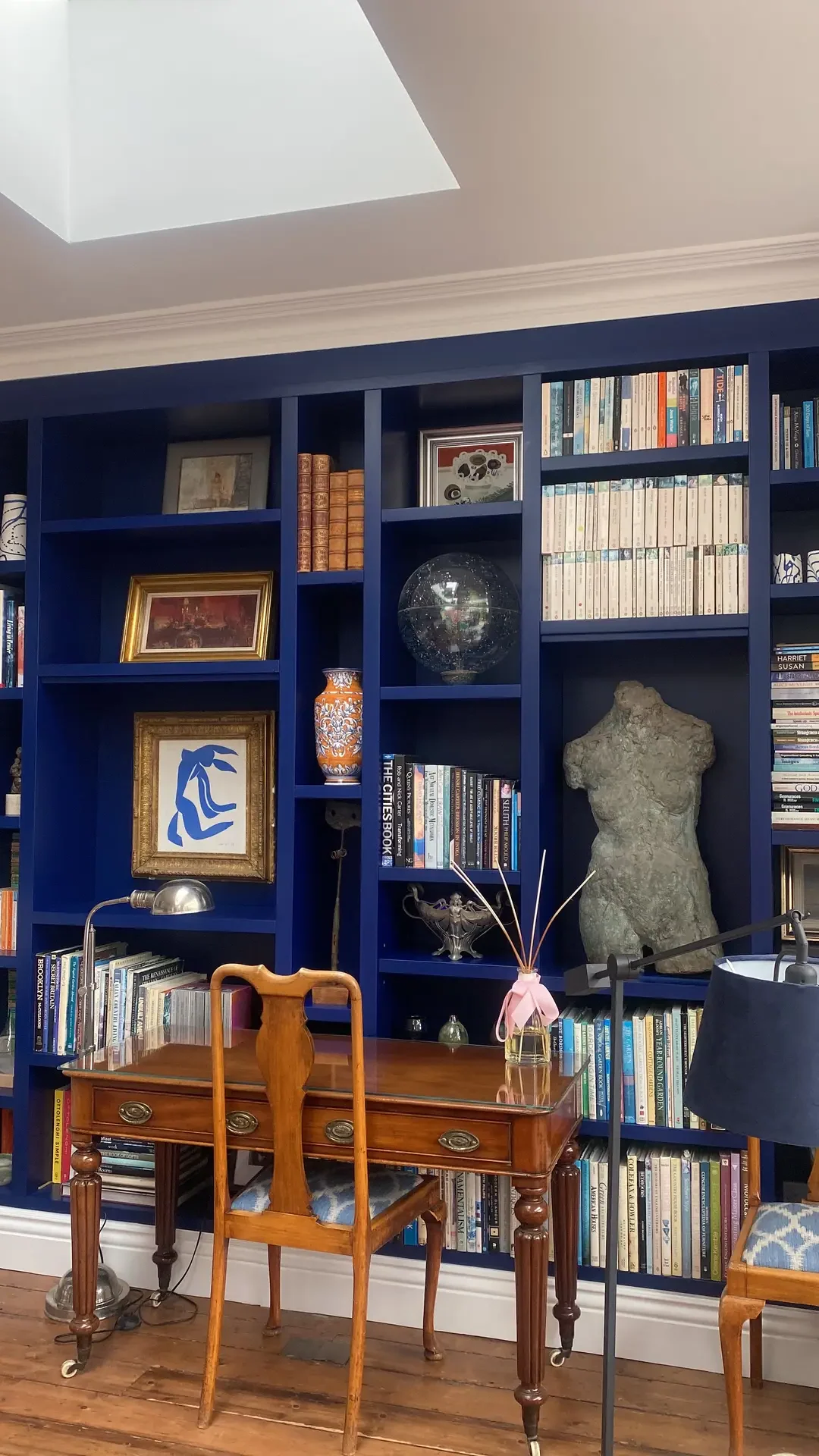 Save
Save Especially in small spaces, built-in storage can be a real lifesaver.
Here you can discreetly store your belongings.
This allows you to make optimal use of the space in your living room and avoids the need for additional furniture like cabinets and shelves, which would otherwise take up even more of your precious space.
Best of all: Built-in storage can be individually planned and adapted to your specific room.
6. Vertical Garden
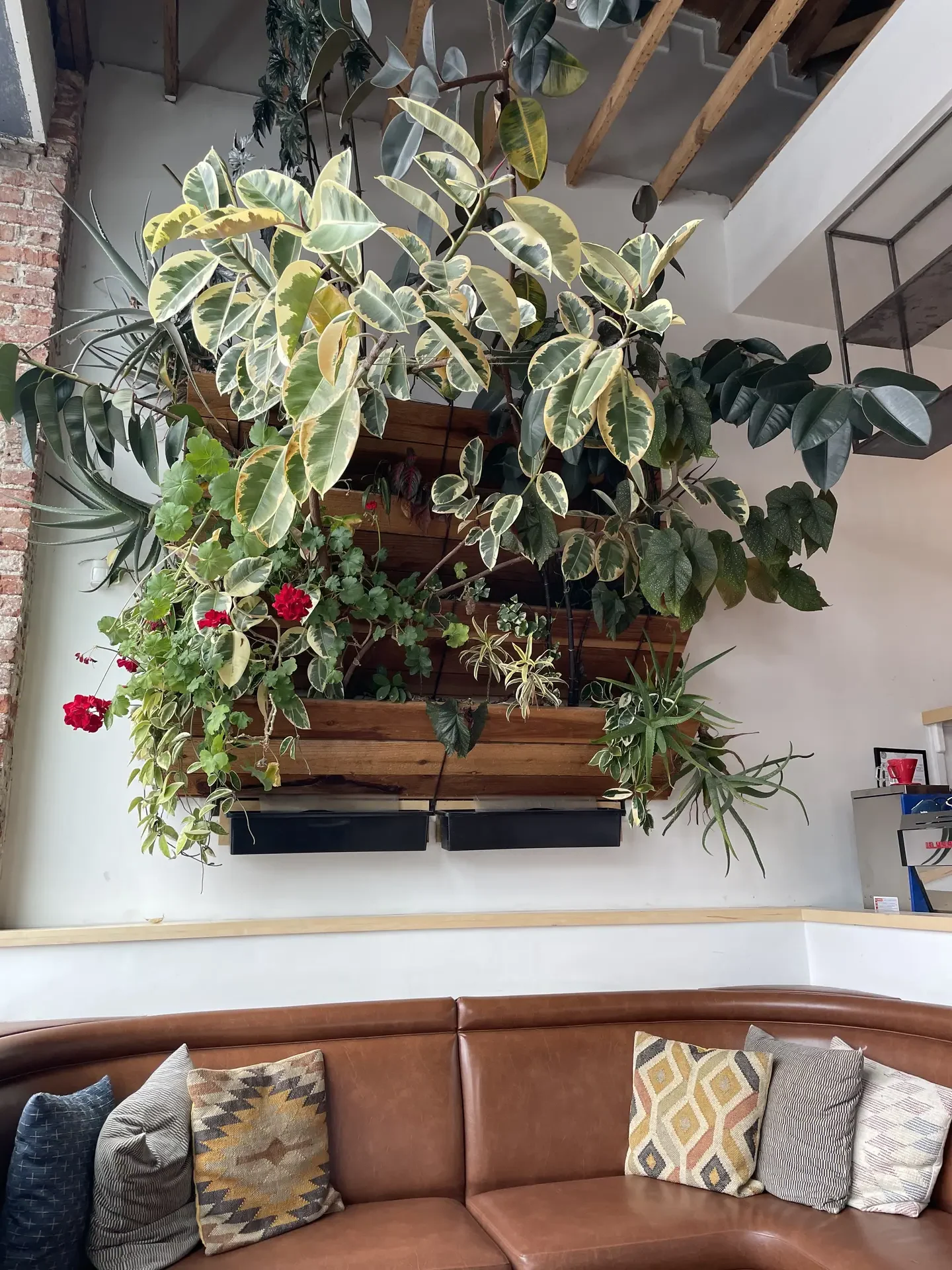 Save
Save And here’s another idea for people who love eye-catching looks.
If you love plants and can’t get enough of them, you should consider getting a vertical garden.
A vertical garden is a real showstopper, brings greenery and life to your living room, and also improves the indoor climate.
A vertical garden can take many different forms and might consist of hanging planters or entire wall modules. There’s something for everyone, whatever your taste and budget.
7. Symmetrical Setup
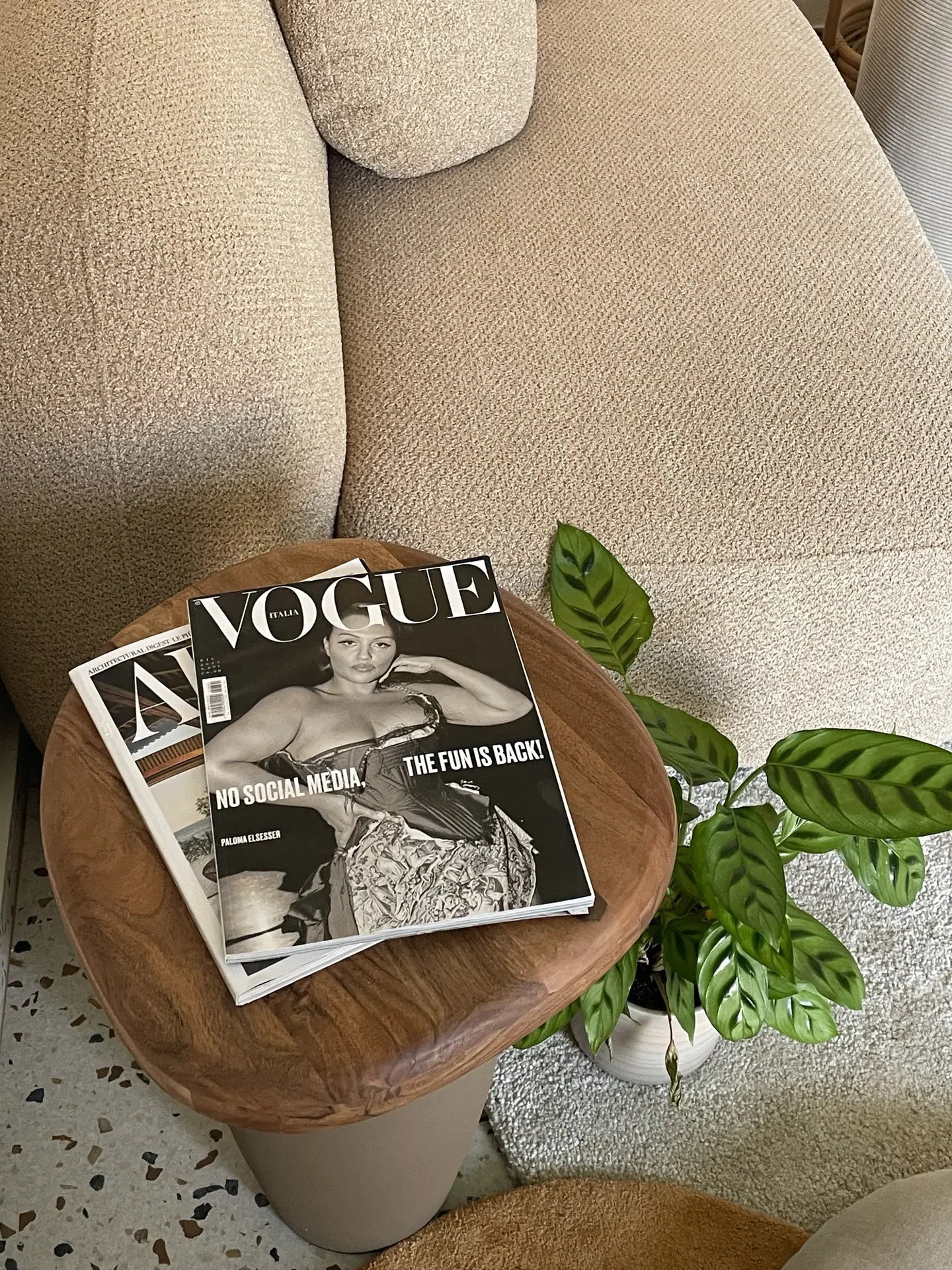 Save
Save You can create a symmetrical look in several ways.
For example, you can place identical small side tables to the right and left of your sofa.
Or, if you have a two-seater sofa, you can place two identical armchairs opposite it.
8. Scandinavian Hygge-Corner
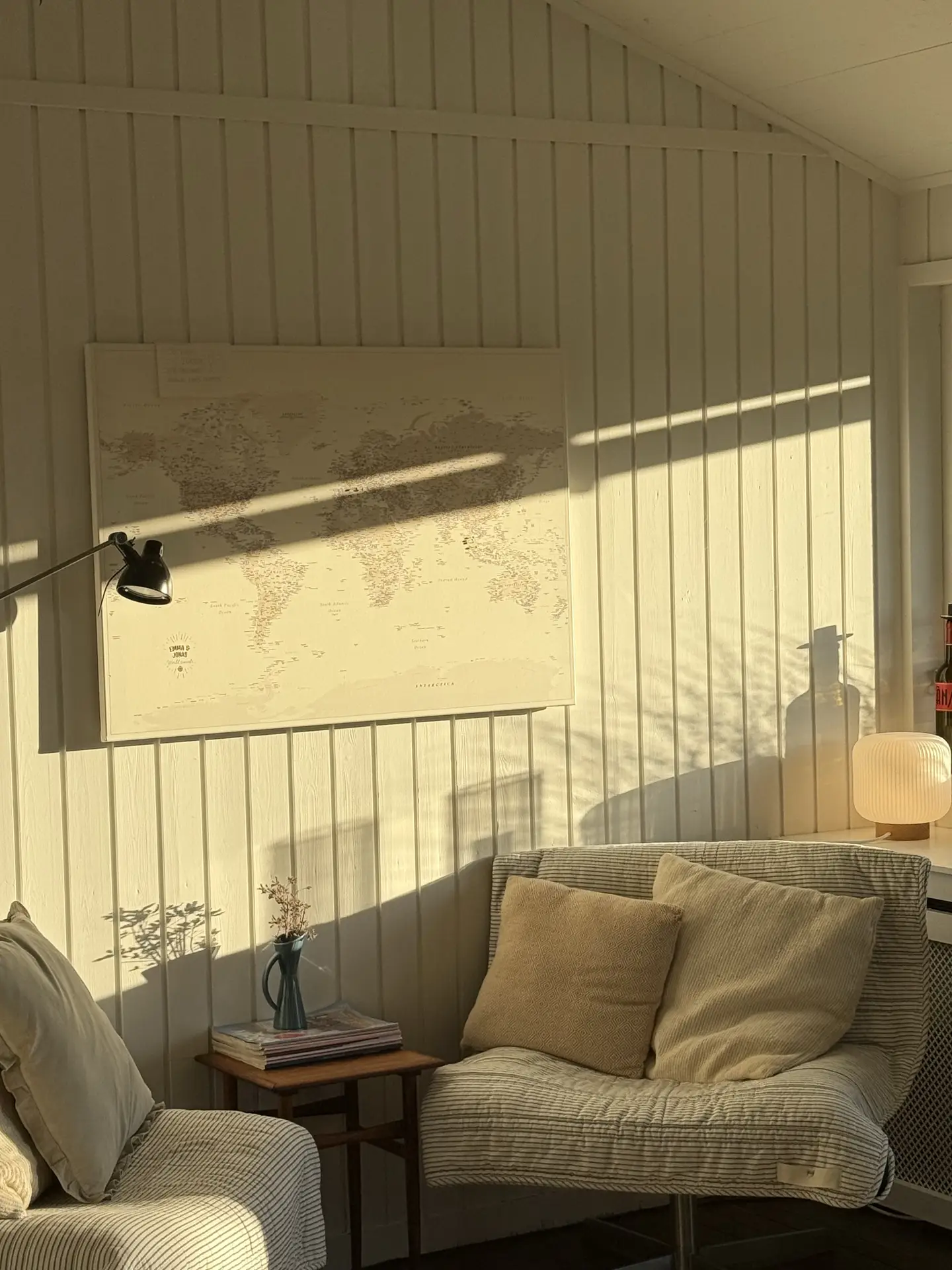 Save
Save The Scandinavians are known for coining the word “hygge”.
Now, the word has spread around the world and everyone wants to bring that special feeling of coziness into their own home.
If you want to create a typical Scandinavian retreat, I recommend using light colors and light wood furniture. Also typical of Scandinavian design: Clean shapes and lines.
To make it truly homey, cushions and blankets are essential.
Indirect lighting from small lamps or candles further enhances the atmosphere.
9. The Accent Wall Statement
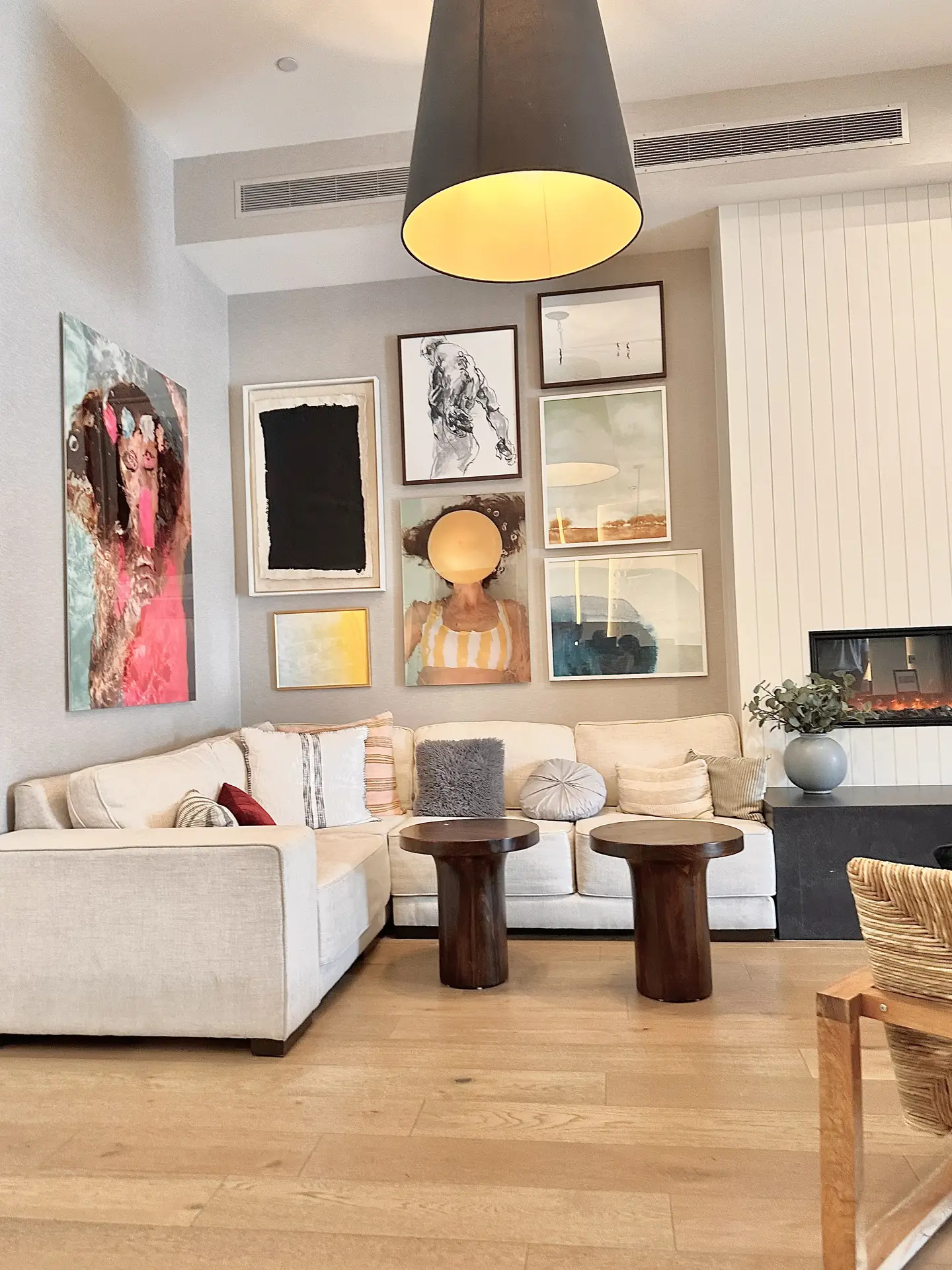 Save
Save Are four plain walls too boring for you? How about an accent wall?
An accent wall can take many different forms.
For example, you could paint one wall a bold color, use wallpaper, hang a striking piece of art or create a gallery wall.
There are no limits to your creativity.
One thing is for sure: An accent wall makes a real statement and, as the name suggests, adds a special touch.
Related: 21 Living Room Decor Ideas For Walls To Get Inspired By
10. The Low-Profile Look
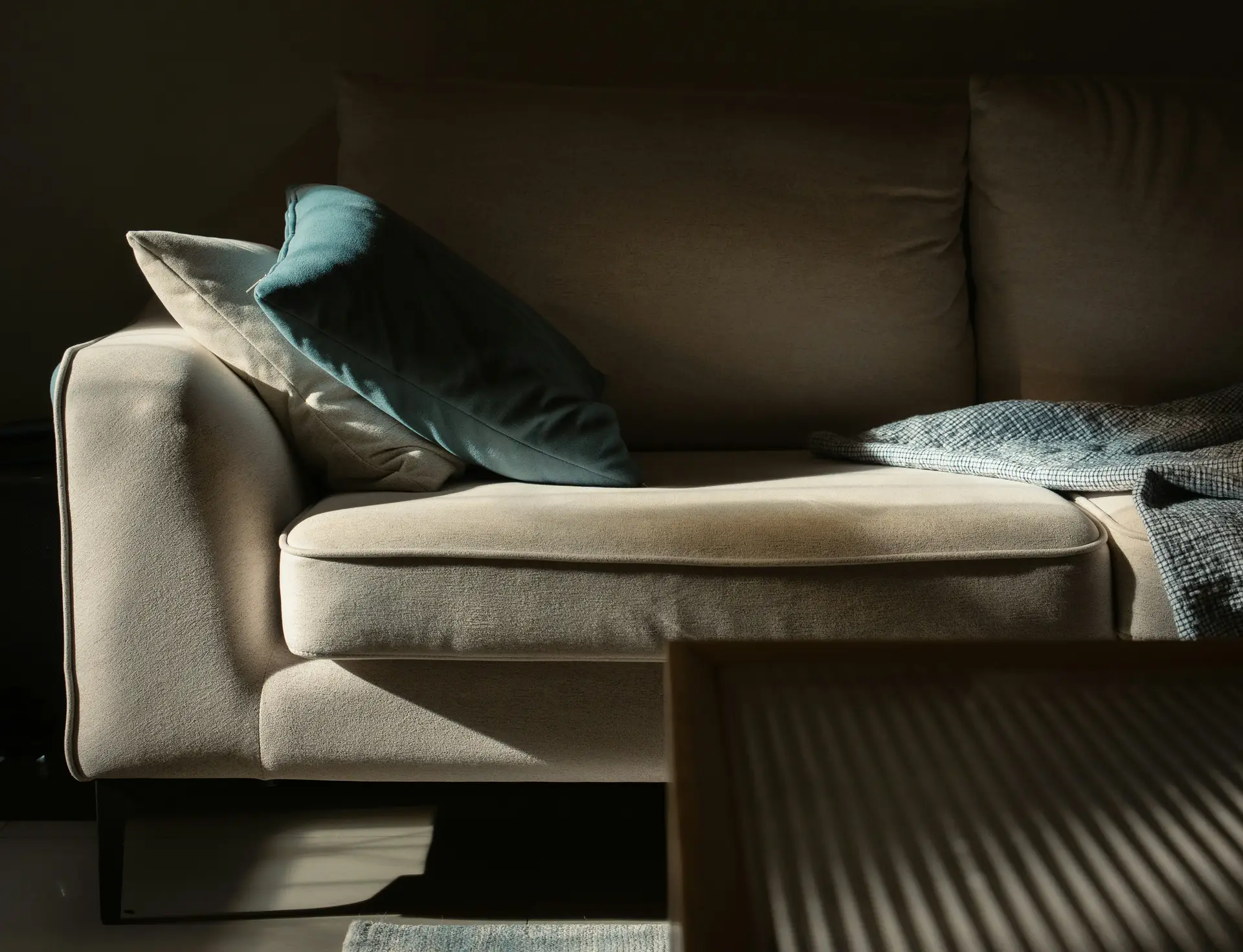 Save
Save The low-profile look primarily utilizes low-profile furniture, which makes the room appear larger.
This makes it particularly suitable for small living rooms with limited space.
In my opinion, the overall look is modern, understated and unobtrusive.
11. Layered Lighting – Living Room Ideas
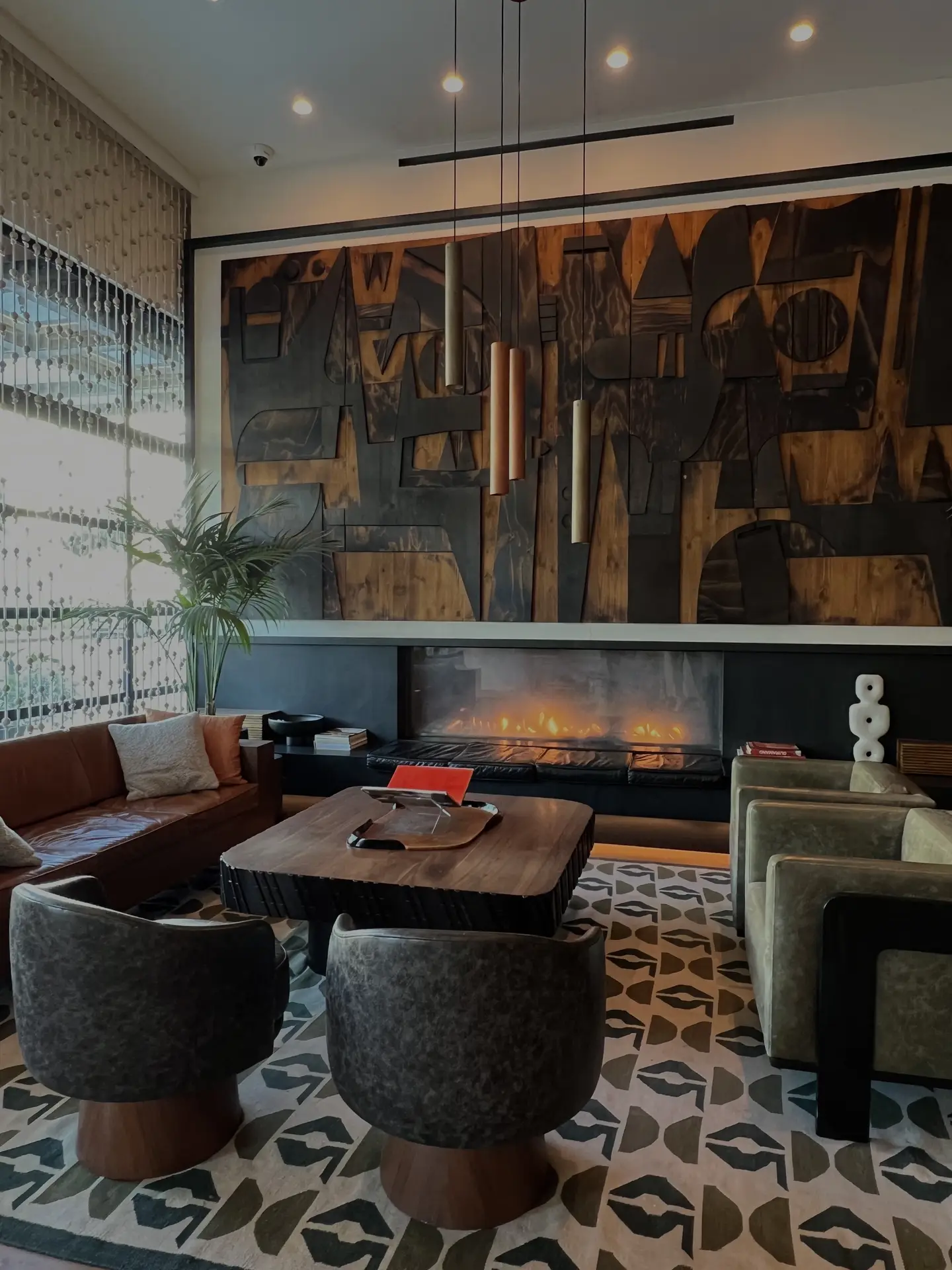 Save
Save Imagine you only had one harsh overhead light. It would be virtually impossible to create a cozy, inviting atmosphere.
That’s precisely why I think layered lighting is so important.
Layer your light sources and you’ll have the perfect light for every occasion.
For example, you could place a reading lamp by your sofa or in your reading nook, put a statement lamp next to your lowboard, have candles on the coffee table or highlight a favorite picture with accent lighting.
Many small light sources make your living room feel significantly cozier.
12. Corner Maximization
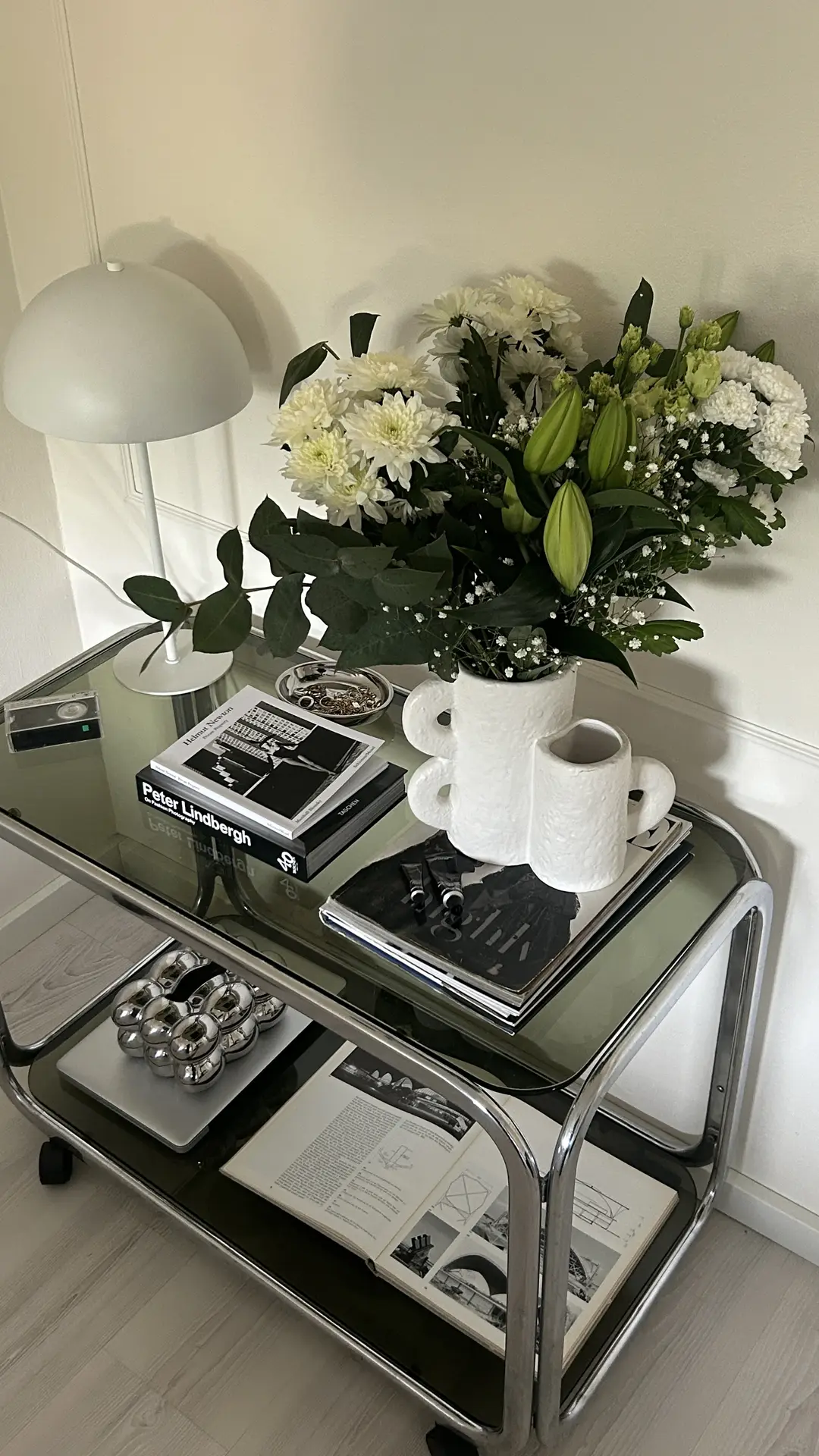 Save
Save Unused corners are the perfect spot to get even more out of your living room.
Here you can create additional storage space, which is especially valuable for small living rooms.
Furniture pieces you could use here include:
- Corner shelves,
- Benches,
- Side tables,
- Serving carts or bar carts,
- Coffee station
13. Greenery Integration
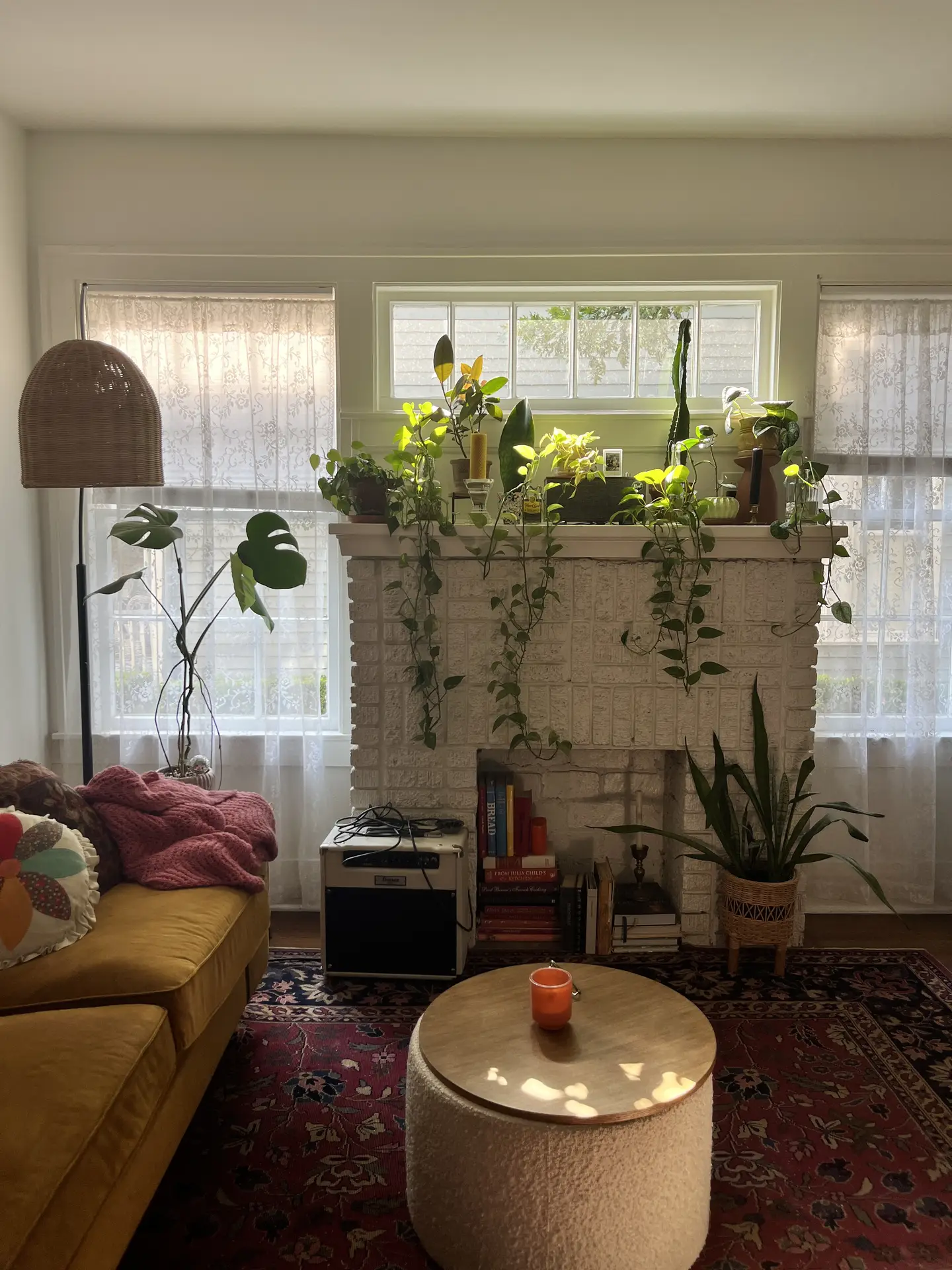 Save
Save If a vertical garden wall seems too drastic, you can, of course, bring more life and greenery to your room with individual plants.
There are no limits to your choice of plants. You can opt for trailing plants, potted plants, or even cacti.
14. Mix & Match Seating
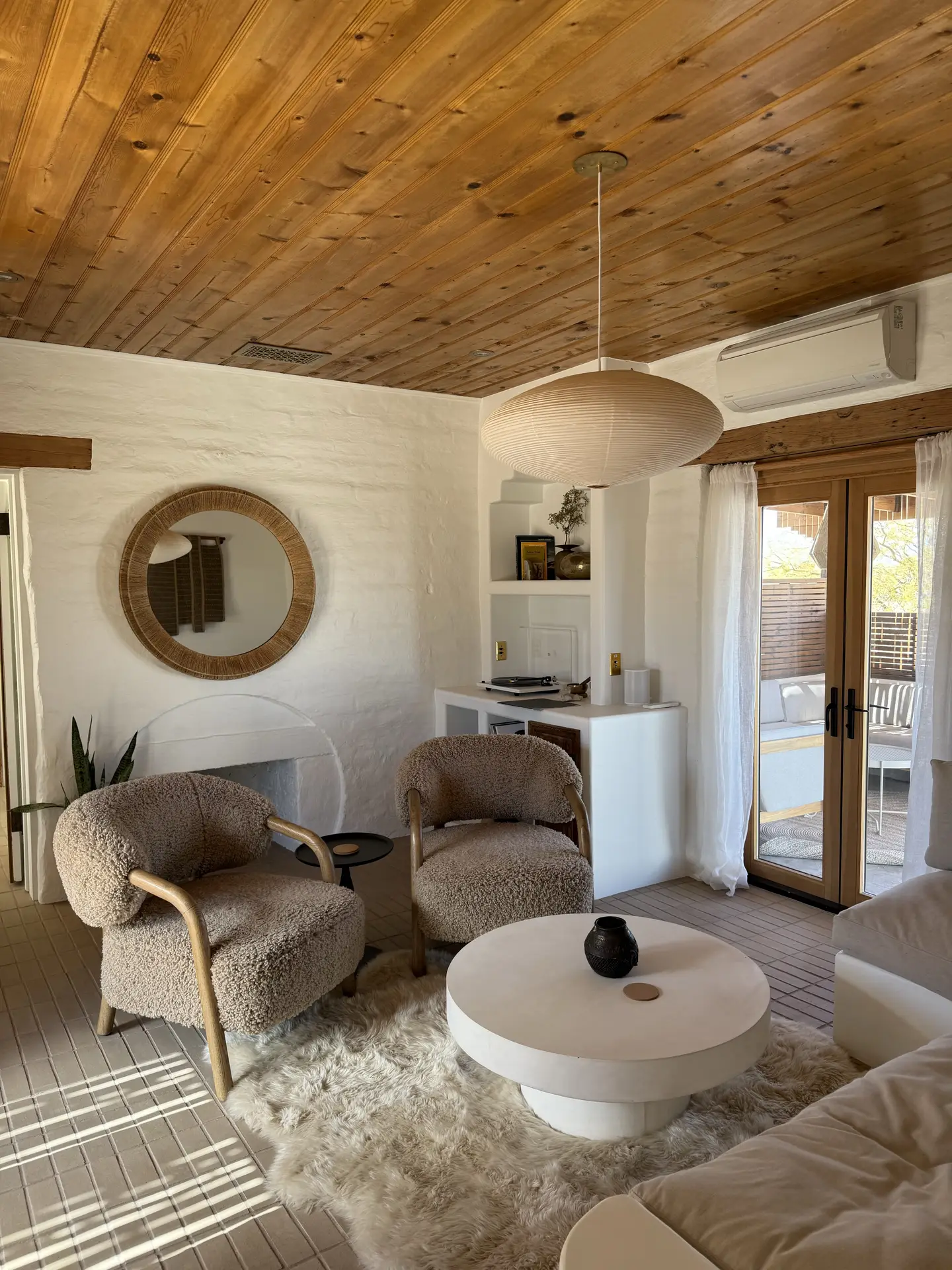 Save
Save Mix and match seating lets you create a unique, varied look that’s anything but monotonous.
Plus: You can be totally creative and combine different styles and furniture. Think “breaking the rules.”
15. Natural Base & Bold Accents
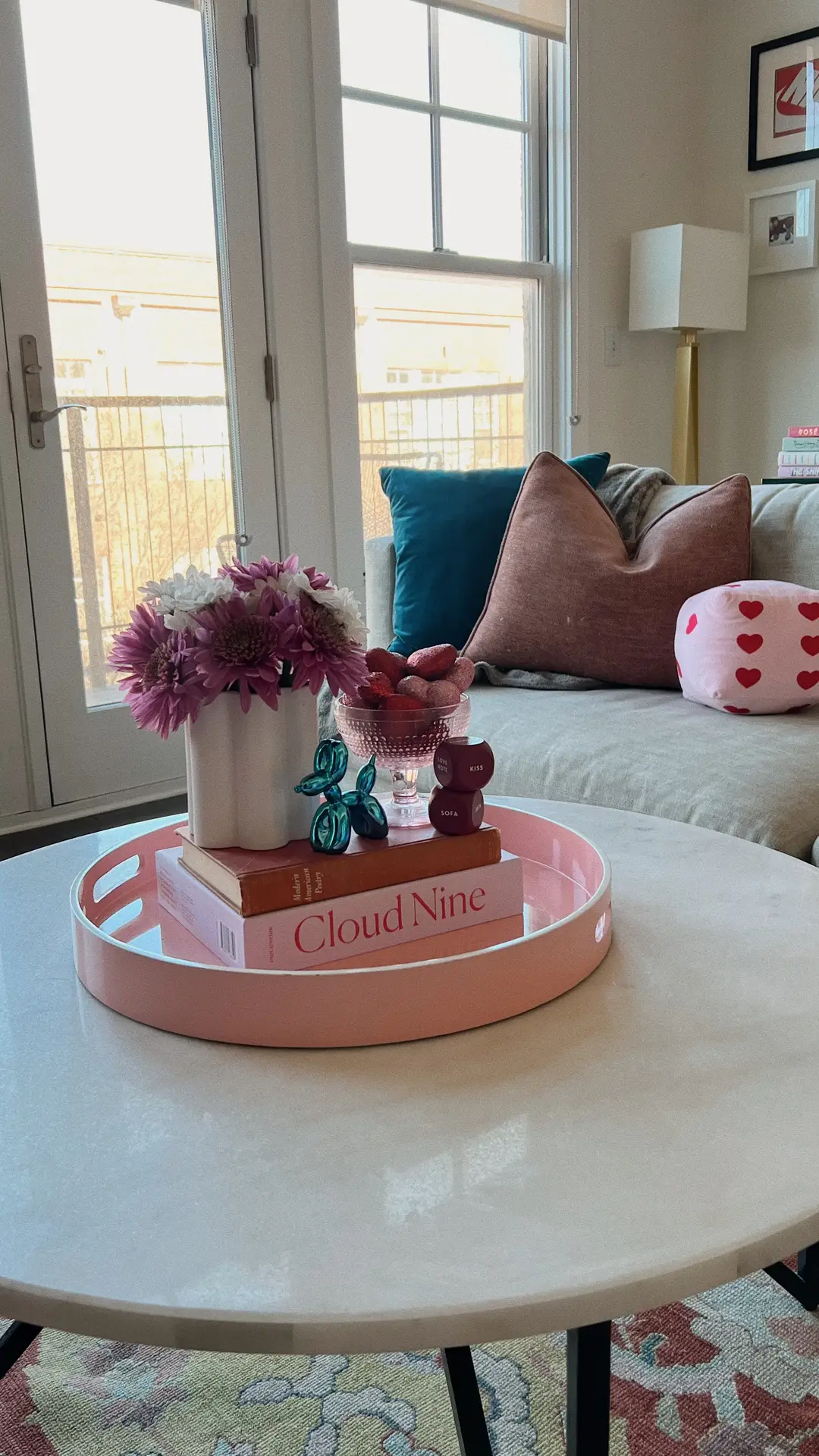 Save
Save Do you love basic colors but want to add a pop of color? Then this idea might be just what you’re looking for.
Keep your living room in simple, natural colors from the same palette and add a few bold, vibrant pops of color.
To recreate the look in the photo, you’ll need some colorful cushions for your sofa, a pink tray with a red and a pink book stacked on top of each other, a small turquoise figurine, and pink flowers in a ceramic vase.
16. Cozy Fireplace (Reimagined)
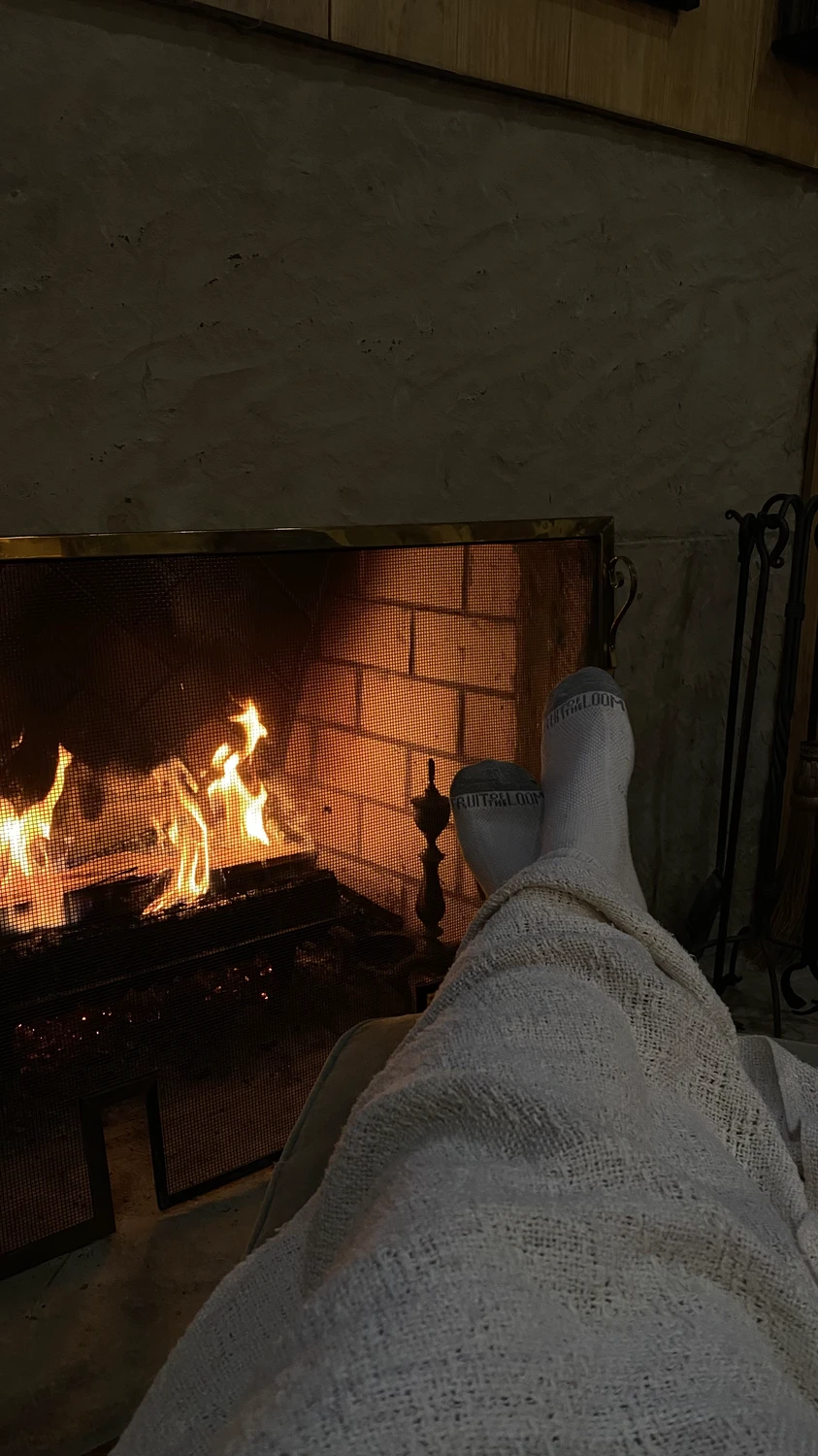 Save
Save There’s nothing quite like a cozy fireplace in the living room.
If you have one, I’m so envious, haha! It’s truly my dream to have a fireplace in my living room someday and spend cozy winter evenings there.
A fireplace in your living room gives you a natural focal point around which you can arrange your seating area with a sofa, coffee table and so on.
And the best part? You can decorate fireplaces seasonally, depending on the time of year. I love that!
17. Textile Layering
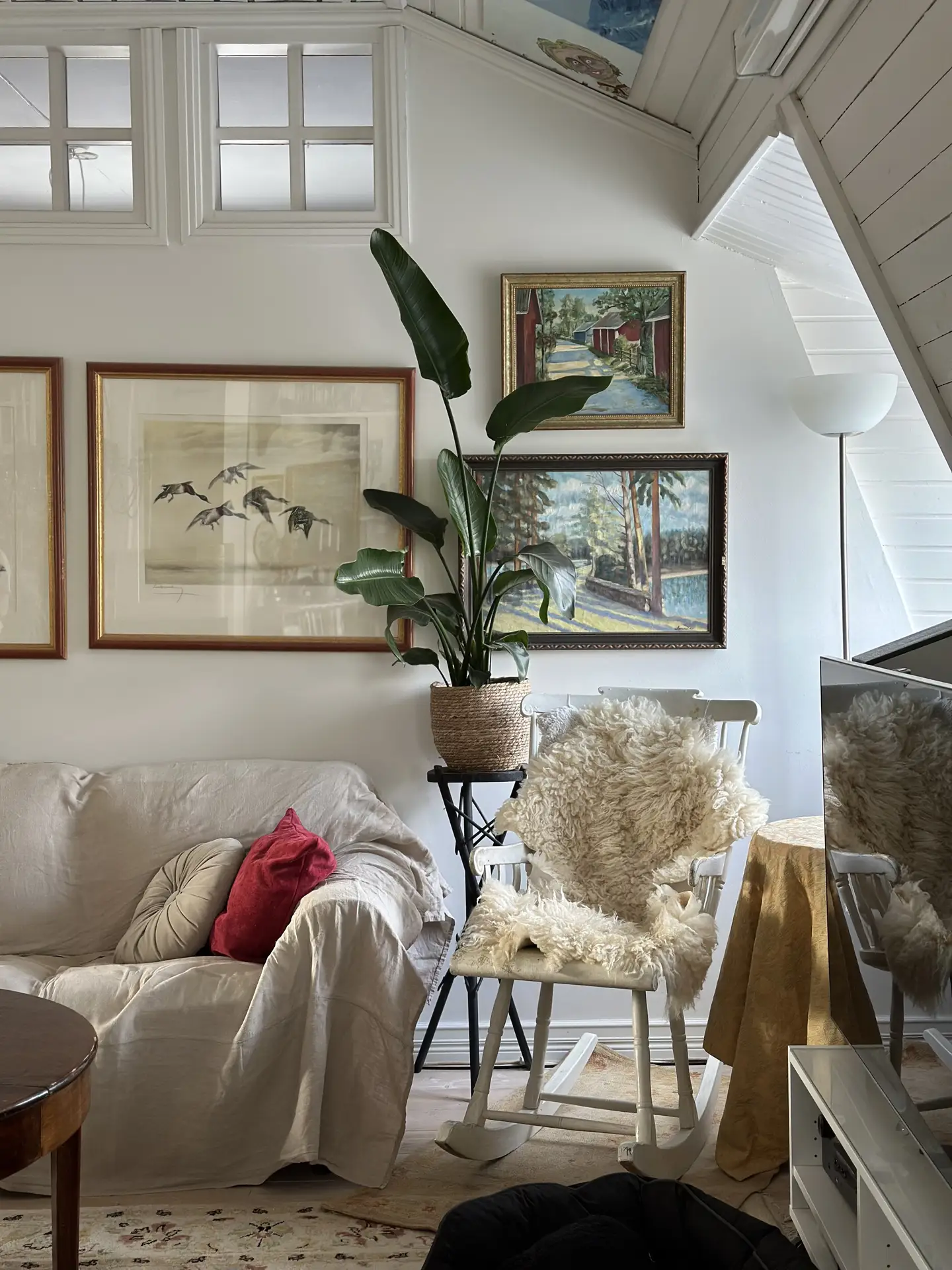 Save
Save You can also use textiles to create more visual depth and dimension in your living room.
Feel free to use different materials to generate more visual interest. This will make your living room look dynamic rather than flat.
For example, you can combine linen, wool, cotton, bouclé and velvet.
18. Tech-Integrated Design
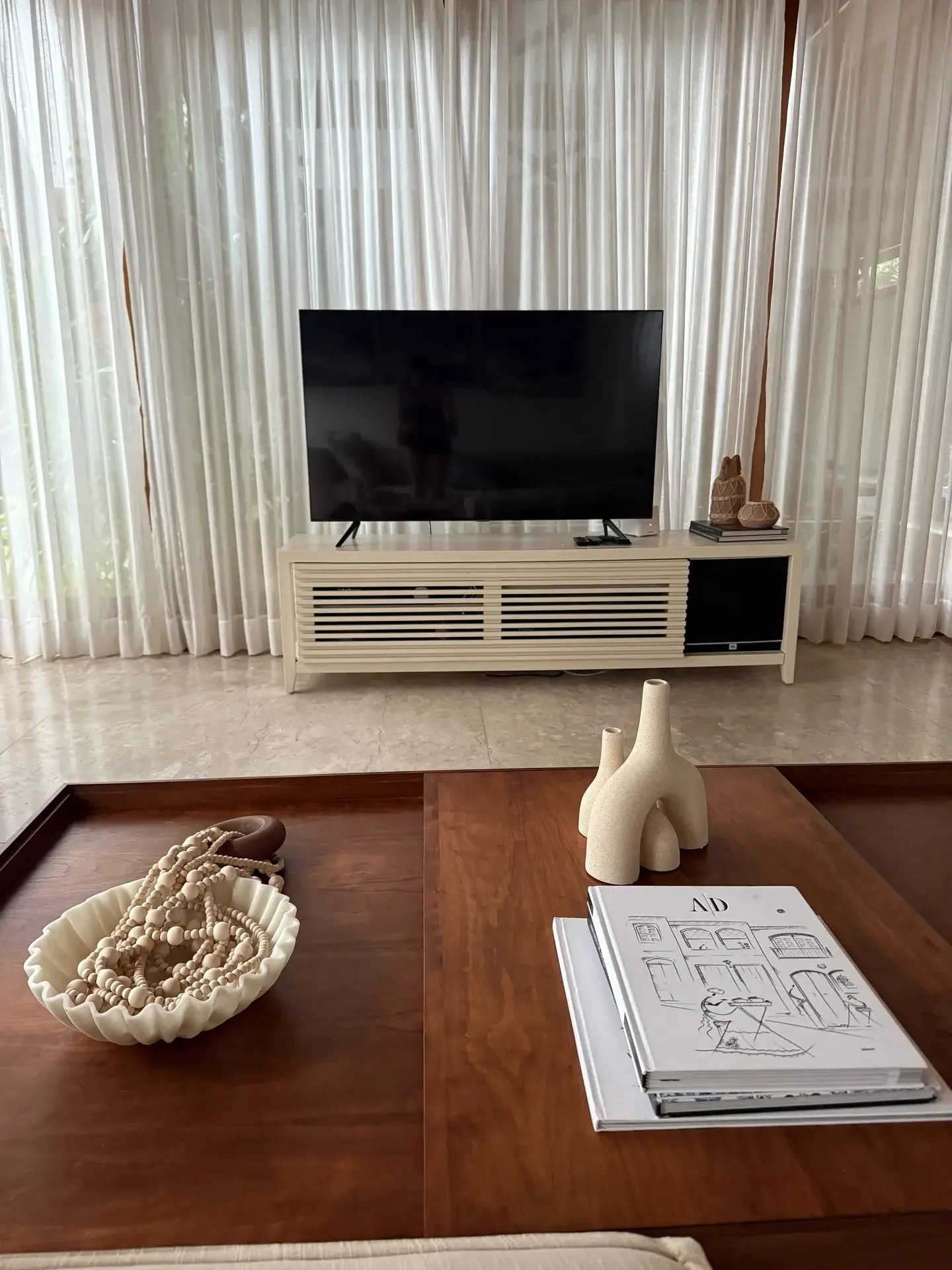 Save
Save Do you know that feeling: The cable mess under the TV is gigantic and no matter how tidy your living room is, the thousands of cables always draw attention?
That’s exactly why it can be helpful to use cable management boxes and furniture with integrated cable routing.
19. L-Shaped Sectional
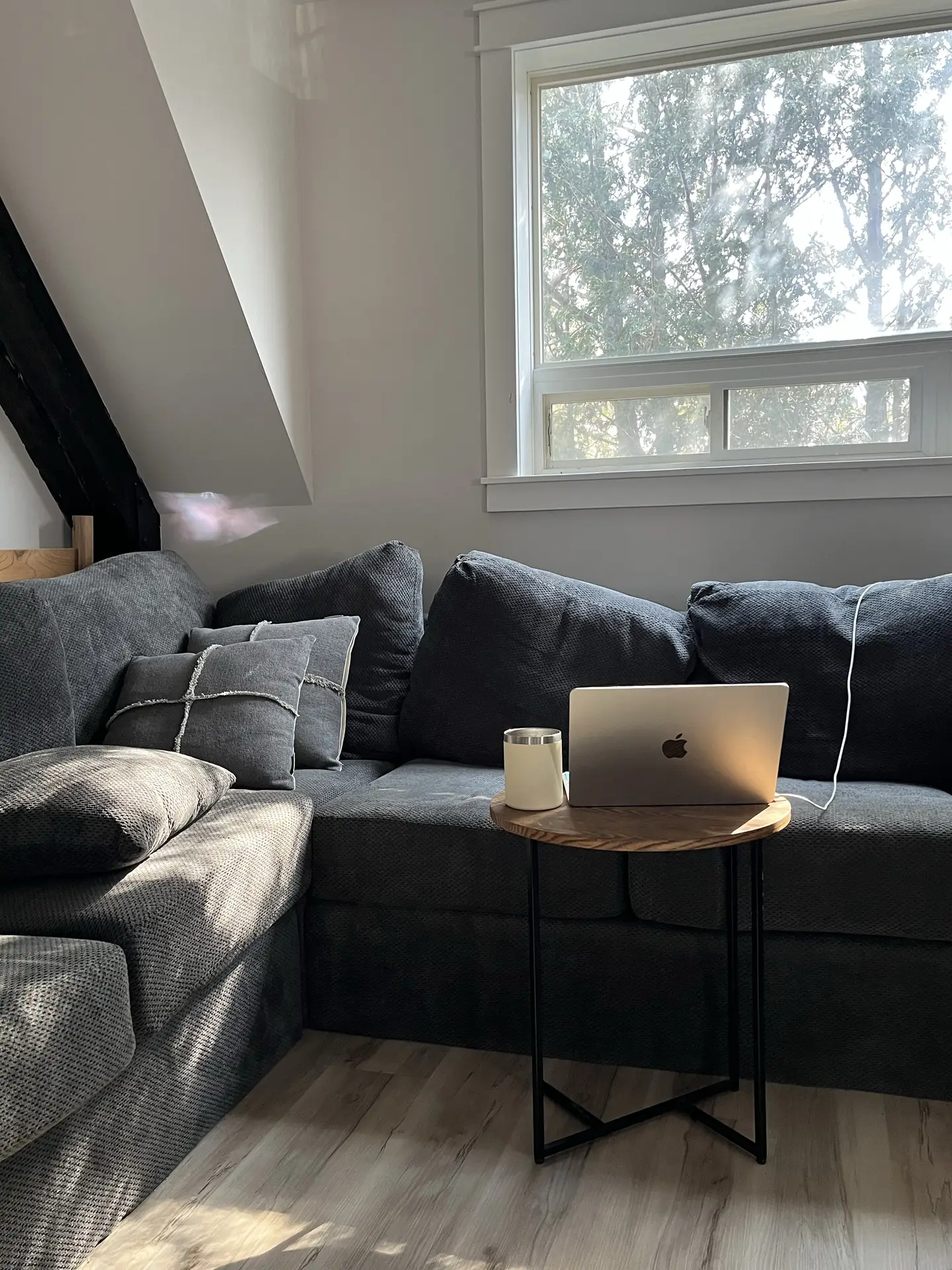 Save
Save The great thing about L-shaped sectional sofas is that they offer plenty of seating space, making them ideal for families and social gatherings.
Furthermore, their shape helps structure the room and they can even serve as room dividers between the living and dining areas.
Another advantage: They make perfect use of corners, so no space is wasted.
20. Reflective Surfaces
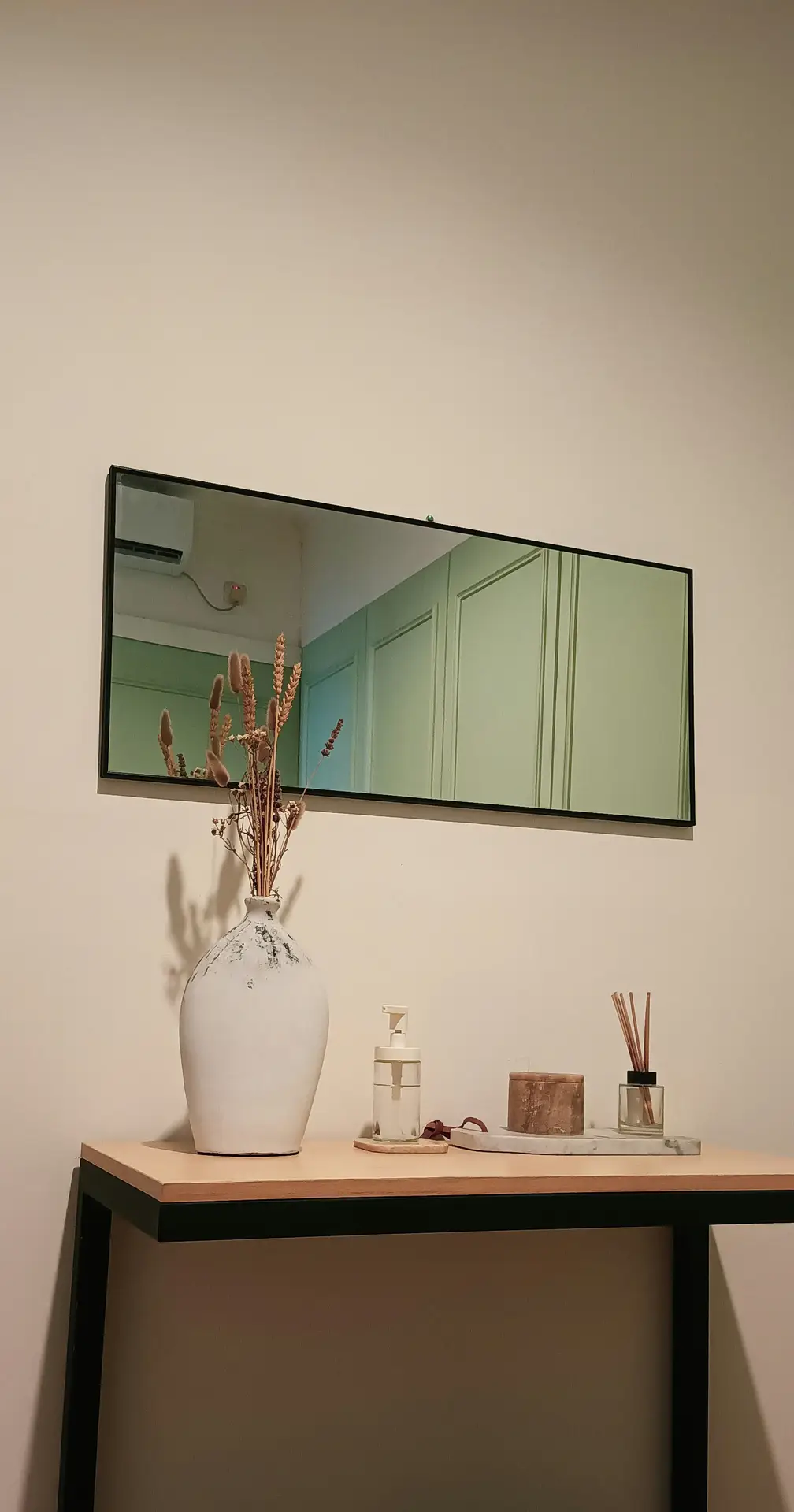 Save
Save Especially if you have a small living room and want it to appear larger, you should use reflective surfaces.
Placed opposite windows, they reflect the most light. This makes the whole room brighter and appear larger.
21. Hidden Storage – Living Room Ideas
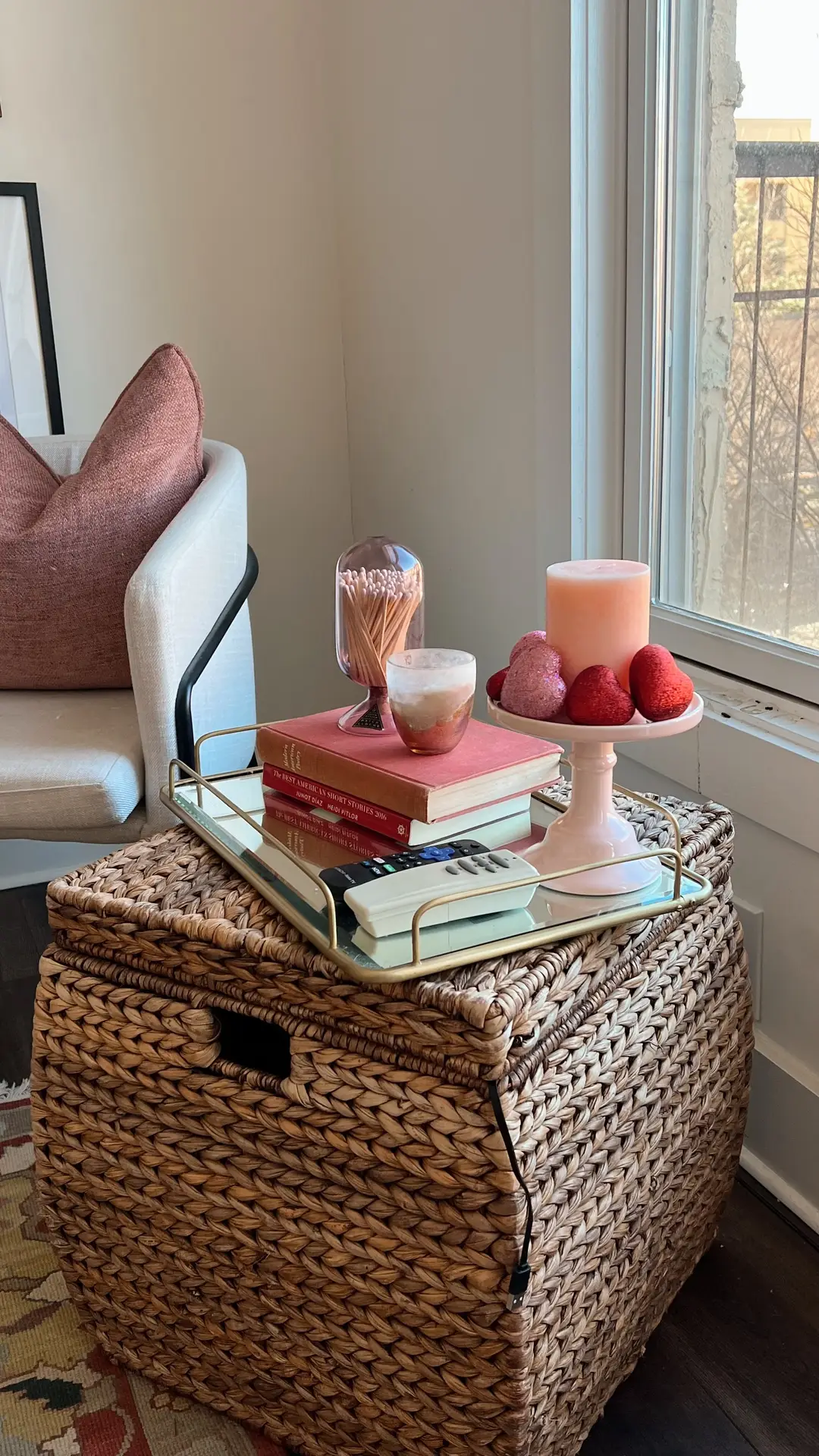 Save
Save Hidden storage keeps your living room looking tidy and allows you to stash your belongings where no one would expect them.
This could be in benches or fold-out coffee tables, for example.
This type of storage is especially valuable for small apartments with limited space.
Solving Common Problems
When you’re trying to create the perfect living room, you’ll probably hit some obstacles. That’s totally normal, you’re not alone in this.
So let me walk through common challenges and how to handle them.
Weird architectural features:
If you have sloped ceilings and odd niches, use them for storage with corner shelves and low cabinets or turn them into a cozy reading spot. The heater destroys the overall look? Hide them with paneling or furniture. Just don’t put furniture too close or you’ll block the heat. Columns and pillars can actually work as part of your design or as room dividers if you lean into them.
Low ceilings:
You want your room to feel taller? Use vertical stripes or floor-length curtains. Both create the illusion of height. Choose low furniture so there’s more vertical space above and skip pendant lights (you’ll hit your head). Go with wall-mounted lamps instead. Light colors on ceiling and walls also make it feel higher.
Not enough natural light:
Put mirrors across from windows. They’ll bounce the light around. Use light, reflective colors and glossy surfaces. They reflect light too, which makes the room brighter and more welcoming. And go with light, sheer curtains instead of heavy blackout ones.
Oddly shaped rooms:
Do you have trouble finding furniture that fits? Sometimes you need custom pieces made for those weird corners and angles.
Renter-friendly solutions:
If you’re on the hunt for items that are easy to remove and won’t damage anything, I recommend to go with wall stickers instead of paint. You could also use freestanding shelves instead of wall-mounted cabinets and tension rod curtains (no drilling needed). If you want a new floor but can’t change your current one, lay down rugs to cover your current floor temporarily. Use furniture and decor as your main focus so people don’t notice the floors as much.
Pet and kid-friendly design:
Living with kids or pets? Get durable, washable fabrics like leather or microfiber. They’re a total lifesaver (trust me, I have a Siberian Husky.) Dark or patterned rugs hide stains way better than light ones. It’s also important to protect sharp corners and edges or just avoid furniture with sharp edges entirely. Plus: I recommend to choose scratch-resistant surfaces and materials that last. Your future self will thank you.
Budget-Specific Ideas
Depending on your budget, you might have different ideas about what you can afford and what you want. And that’s perfectly fine.
I’ve categorized what’s possible depending on your budget:
Luxury/High-End Ideas
- Custom-made furniture or sofas in designer fabrics
- Statement lighting (e.g., a sculptural lamp)
- Artwork or limited-edition prints
- High-quality materials: marble, solid wood, silk
Mid-Range Solutions
- High-quality basics with good value for money (e.g., sofas from Westwing, MADE or H&M Home Premium)
- A mix of designer and mainstream pieces
- Replacing accent furniture instead of buying everything new
- Wall paint or wallpaper for a fresh look
- Upcycling vintage finds (e.g., sanding and repainting a side table)
- New cushion covers, plants or mirrors make small changes with a big impact
Investment Pieces vs. Savings Potential
I recommend investing in a good sofa because it’s a piece of furniture you’ll use every day. This is where family, friends, neighbors and acquaintances sit and you’d be annoyed if the cushions were worn out after a year and you had to invest in a new sofa, believe me. The sofa is too important a piece of furniture in your living room to skimp on. I also wouldn’t skimp on good curtains. High-quality curtains won’t fade in the first bit of sunlight and simply look much better.
You don’t have to spend a fortune on things like decorations, lamps, cushions and wall art. These are all items you can gradually replace with more expensive ones or you can keep them in the lower price range and swap them out depending on your mood, the season or current trends, if you like.
Step-By-Step Transformation Process
Your living room transformation feels like climbing a mountain? Take a breath, it doesn’t have to be that way.
It doesn’t have to be this huge overwhelming obstacle. The trick is breaking it into smaller pieces you can actually handle.
Here’s what works for me:
Weekly plan: Tackle rooms one at a time. Make a realistic plan that actually fits with your work and life. Don’t try to do everything at once, that’s how you burn out.
Priorities: Start with the big things first, like walls and furniture. Then move to details like decor and lighting.
Avoid mistakes: Plan ahead and measure everything carefully. Get color swatches so you can see what actually works together. Common mistakes are using too many colors or furniture that’s the wrong size for the space.
DIY or professional, no in-between: Small projects? You can handle those yourself if you’ve got basic skills. Electrical and carpentry work? Call a professional. This saves you frustration and time.
Ready To Transform Your Space?
Here’s the thing: Your living room doesn’t need to be perfect. It just needs to feel like yours.
Go classic if that’s what you like or keep it relaxed and modern.
Even changing a few small things can shift the whole vibe.
The goal isn’t some magazine-ready showroom. It’s a space where you actually want to be, it should become your own little happy place.
You need more inspiration for your home? Feel free to browse my blog. You’ll find numerous posts on all sorts of topics related to home decor and organization.
Did you enjoy this article?
If you’d like, treat me to a coffee ☕ Your support means the whole world to me!
